
リバータリアニズム
Libertarianism

John
Locke, regarded as the father of liberalism
☆ リバタリアニズム(libertarianism) は、個人的な自由、経済的な自由の双方を重視する、自由主義上の政治思想・政治哲学の立場である。経済的な自由を重視する新自由主義と似ているが、リバタ リアニズムでは個人的な自由をも重んじる[3]。他者の身体や正当に所有された物質的、私的財産を侵害しない限り、各人が望む全ての行動は基本的に自由で あると主張する。リバタリアニズムを主張する者はリバタリアンと呼ばれる。日本語では完全自由主義、自由人主義、自由至上主義、自由意志主義などの訳語が ある。 なお、哲学、神学、形而上学においては決定論に対して、自由意志と決定論が両立しないことを認めつつ(非両立説 incompatibilism)、非決定論から自由意志の存在を唱える立場を指す。この意味では自由意志論などと訳される場合が多い(日本語ウィキペ ディア「リバタリアニズム」)。
| Libertarianism (from
French: libertaire, itself from the Latin: libertas, lit. 'freedom') is
a political philosophy that upholds liberty as a core
value.[1][2][3][4] Libertarians seek to maximize autonomy and political
freedom, emphasizing equality before the law and civil rights to
freedom of association, freedom of speech, freedom of thought and
freedom of choice.[4][5] Libertarians are often skeptical of or opposed
to authority, state power, warfare, militarism and nationalism, but
some libertarians diverge on the scope of their opposition to existing
economic and political systems. Various schools of libertarian thought
offer a range of views regarding the legitimate functions of state and
private power. Different categorizations have been used to distinguish
various forms of Libertarianism.[6][7] Scholars distinguish libertarian
views on the nature of property and capital, usually along left–right
or socialist–capitalist lines.[8] Libertarians of various schools were
influenced by liberal ideas.[9] In the mid-19th century,[10] libertarianism originated as a form of left-wing politics such as anti-authoritarian and anti-state socialists like anarchists,[11] especially social anarchists,[12] but more generally libertarian communists/Marxists and libertarian socialists.[13][14] These libertarians sought to abolish capitalism and private ownership of the means of production, or else to restrict their purview or effects to usufruct property norms, in favor of common or cooperative ownership and management, viewing private property as a barrier to freedom and liberty.[19] While all libertarians support some level of individual rights, left-libertarians differ by supporting an egalitarian redistribution of natural resources.[20] Left-libertarian[26] ideologies include anarchist schools of thought, alongside many other anti-paternalist and New Left schools of thought centered around economic egalitarianism as well as geolibertarianism, green politics, market-oriented left-libertarianism and the Steiner–Vallentyne school.[30] After the fall of the Soviet Union, libertarian socialism grew in popularity and influence as part of anti-war, anti-capitalist and anti- and alter-globalisation movements.[31][32] In the mid-20th century, American right-libertarian[35] proponents of anarcho-capitalism and minarchism co-opted[13] the term libertarian to advocate laissez-faire capitalism and strong private property rights such as in land, infrastructure and natural resources.[36] The latter is the dominant form of libertarianism in the United States.[34] This new form of libertarianism was a revival of classical liberalism in the United States,[37][page needed] which occurred due to American liberals' embracing progressivism and economic interventionism in the early 20th century after the Great Depression and with the New Deal.[38] Since the 1970s, right-libertarianism has spread beyond the United States,[39] with right-libertarian parties being established in the United Kingdom,[40] Israel,[41][42][43][44] South Africa[45] and Argentina.[46] Minarchists advocate for night-watchman states which maintain only those functions of government necessary to safeguard natural rights, understood in terms of self-ownership or autonomy,[47] while anarcho-capitalists advocate for the replacement of all state institutions with private institutions.[48] Some right-wing variants of libertarianism, such as anarcho-capitalism, have been labeled as far-right or radical right by some scholars.[49][50][51][52] Right-wing libertarian ideals are also prominent in far-right American militia movement associated with extremist anti-government ideas.[53] Traditionally, libertarian practice has taken extra-parliamentary form,[citation needed] such as in the Spanish Revolution of 1936, the New Left, the Zapatista uprising, the Tea Party movement, and the Rojava Revolution. In 2022, student activist and self-described libertarian socialist Gabriel Boric became head of state of Chile after winning the 2021 Chilean presidential election with the Apruebo Dignidad coalition.[54][55][56] In 2023, Argentine economist Javier Milei became the first openly right-wing libertarian head of state,[57] after winning that year's general election with the La Libertad Avanza coalition.[58] |
リバタリアニズム(フランス語: libertaire、ラテン語:
libertas、「自由」に由来)は、自由を中核的価値とする政治哲学である[1][2][3][4]。リバタリアンは自治と政治的自由を最大化しよう
とし、法の下の平等と結社の自由、言論の自由、思想の自由、選択の自由に対する市民権を強調する。
[リバタリアンは権威、国家権力、戦争、軍国主義、ナショナリズムに対して懐疑的であったり反対であったりすることが多いが、既存の経済体制や政治体制に
反対する範囲については異なるリバタリアンもいる。リバタリアン思想のさまざまな学派が、国家権力と私権力の正当な機能に関してさまざまな見解を示してい
る。様々な分類がリバタリアニズムの様々な形態を区別するために使用されてきた[6][7]。学者たちは財産と資本の性質に関するリバタリアンの見解を、
通常は左派-右派または社会主義-資本主義の線に沿って区別している[8]。 19世紀半ば[10]、リバタリアニズムはアナーキスト[11]、特に社会的アナーキスト[12]のような反権威主義者や反国家社会主義者、より一般的に はリバタリアン共産主義者/マルクス主義者やリバタリアン社会主義者のような左翼政治の一形態として生まれた。 これらのリバタリアンは資本主義や生産手段の私有を廃止するか、さもなければその範囲や効果を用益財産規範に限定し、私有財産を自由と解放の障壁とみな し、共有的または協同的な所有と管理を支持しようとした[13][14]。 [左リバタリアン[26]のイデオロギーには、経済的平等主義を中心とする他の多くの反父権主義者や新左翼学派のほか、ジオリバタリアニズム、グリーン・ ポリティクス、市場志向の左リバタリアニズム、シュタイナー=ヴァレンティン学派などとともに、アナーキスト学派の思想が含まれる。 [ソビエト連邦崩壊後、リバタリアン社会主義は反戦運動、反資本主義運動、反グローバリズム運動、分グローバリズム運動の一環として人気と影響力を高めた [31][32]。 20世紀半ばには、アメリカの右派リバタリアン[35]の無政府資本主義や無政府主義の支持者たちが、自由放任の資本主義と土地、インフラ、天然資源など の強力な私有財産権を提唱するためにリバタリアンという用語を共同利用した[13]。 [34]この新しい形のリバタリアニズムは、アメリカにおける古典的自由主義の復活であった[37][要出典]。この復活は、大恐慌後の20世紀初頭にア メリカのリベラル派が進歩主義と経済介入主義を受け入れ、ニューディールを行ったことに起因する。 [1970年代以降、右派リバタリアニズムはアメリカ合衆国以外にも広がっており[39]、イギリス[40]、イスラエル[41][42][43] [44]、南アフリカ[45]、アルゼンチンでも右派リバタリアンの政党が設立されている[46]。ミニャリストは、自己所有権や自治権という観点から理 解される自然権を保護するために必要な政府の機能のみを維持する夜警国家を提唱し[47]、アナーコ・キャピタリストはすべての国家機関を私的機関に置き 換えることを提唱している。 [アナルコ資本主義のようなリバタリアニズムの右翼的な変種は、一部の学者によって極右または急進右派とレッテルを貼られている[49][50][51] [52]。 右翼的なリバタリアンの理想は、過激な反政府思想に関連する極右的なアメリカの民兵運動においても顕著である[53]。 伝統的に、リバタリアンの実践は、1936年のスペイン革命、新左翼、サパティスタ蜂起、ティーパーティー運動、ロジャバ革命のような議会外の形態をとっ てきた[要出典]。2022年、学生活動家で自称リバタリアン社会主義者のガブリエル・ボリッチは、2021年のチリ大統領選挙でアプルーボ・ディグニ ダッド連合で勝利した後、チリの国家元首となった[54][55][56]。 2023年、アルゼンチンの経済学者ハビエル・ミレイは、同年の総選挙でラ・リベルタッド・アヴァンザ連合で勝利した後、初の公然たる右派リバタリアン国 家元首となった[57]。 |
Etymology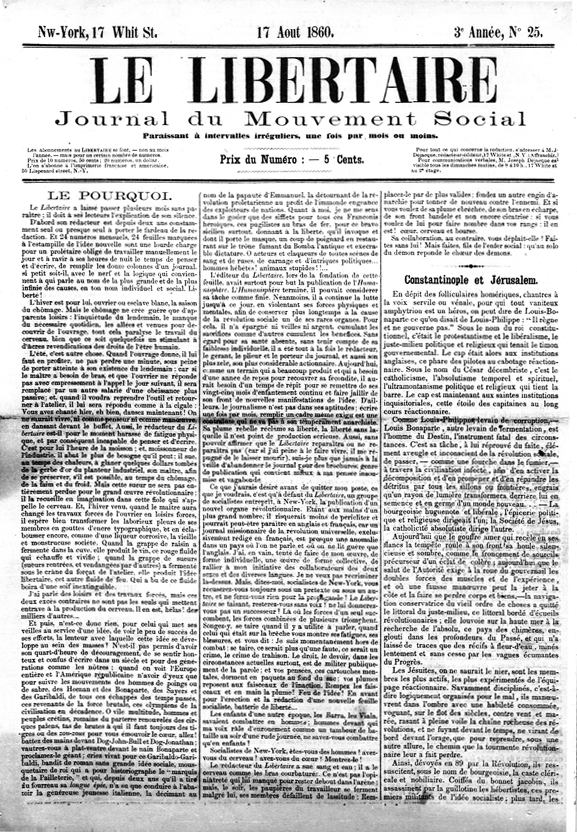 17 August 1860 edition of Le Libertaire, Journal du mouvement social, a libertarian communist publication in New York City The first recorded use of the term libertarian was in 1789, when William Belsham wrote about libertarianism in the context of metaphysics.[59] As early as 1796, libertarian came to mean an advocate or defender of liberty, especially in the political and social spheres, when the London Packet printed on 12 February the following: "Lately marched out of the Prison at Bristol, 450 of the French Libertarians".[60] It was again used in a political sense in 1802 in a short piece critiquing a poem by "the author of Gebir" and has since been used with this meaning.[61][62][63] The use of the term libertarian to describe a new set of political positions has been traced to the French cognate libertaire, coined in a letter French libertarian communist Joseph Déjacque wrote to mutualist Pierre-Joseph Proudhon in 1857.[64] Déjacque also used the term for his anarchist publication Le Libertaire, Journal du mouvement social (Libertarian: Journal of Social Movement) which was printed from 9 June 1858 to 4 February 1861 in New York City.[65] Sébastien Faure, another French libertarian communist, began publishing a new Le Libertaire in the mid-1890s while France's Third Republic enacted the so-called villainous laws (lois scélérates) which banned anarchist publications in France. Libertarianism has frequently been used to refer to anarchism and libertarian socialism since this time.[66][67][68] In the United States, libertarian was popularized by the individualist anarchist Benjamin Tucker around the late 1870s and early 1880s.[69] Libertarianism as a synonym for liberalism was popularized in May 1955 by writer Dean Russell, a colleague of Leonard Read and a classical liberal himself. Russell justified the choice of the term as follows: Many of us call ourselves "liberals." And it is true that the word "liberal" once described persons who respected the individual and feared the use of mass compulsions. But the leftists have now corrupted that once-proud term to identify themselves and their program of more government ownership of property and more controls over persons. As a result, those of us who believe in freedom must explain that when we call ourselves liberals, we mean liberals in the uncorrupted classical sense. At best, this is awkward and subject to misunderstanding. Here is a suggestion: Let those of us who love liberty trade-mark and reserve for our own use the good and honorable word "libertarian."[70][71][72] Subsequently, a growing number of Americans with classical liberal beliefs began to describe themselves as libertarians. One person responsible for popularizing the term libertarian in this sense was Murray Rothbard, who started publishing libertarian works in the 1960s.[73] Rothbard described this modern use of the words overtly as a "capture" from his enemies, writing that "for the first time in my memory, we, 'our side,' had captured a crucial word from the enemy. 'Libertarians' had long been simply a polite word for left-wing anarchists, that is for anti-private property anarchists, either of the communist or syndicalist variety. But now we had taken it over".[13] In the 1970s, Robert Nozick was responsible for popularizing this usage of the term in academic and philosophical circles outside the United States,[34][74][75] especially with the publication of Anarchy, State, and Utopia (1974), a response to social liberal John Rawls's A Theory of Justice (1971).[76] In the book, Nozick proposed a minimal state on the grounds that it was an inevitable phenomenon which could arise without violating individual rights.[77] According to common United States meanings of conservative and liberal, libertarianism in the United States has been described as conservative on economic issues (economic liberalism and fiscal conservatism) and liberal on personal freedom (civil libertarianism and cultural liberalism).[78] It is also often associated with a foreign policy of non-interventionism.[79][80] Definition 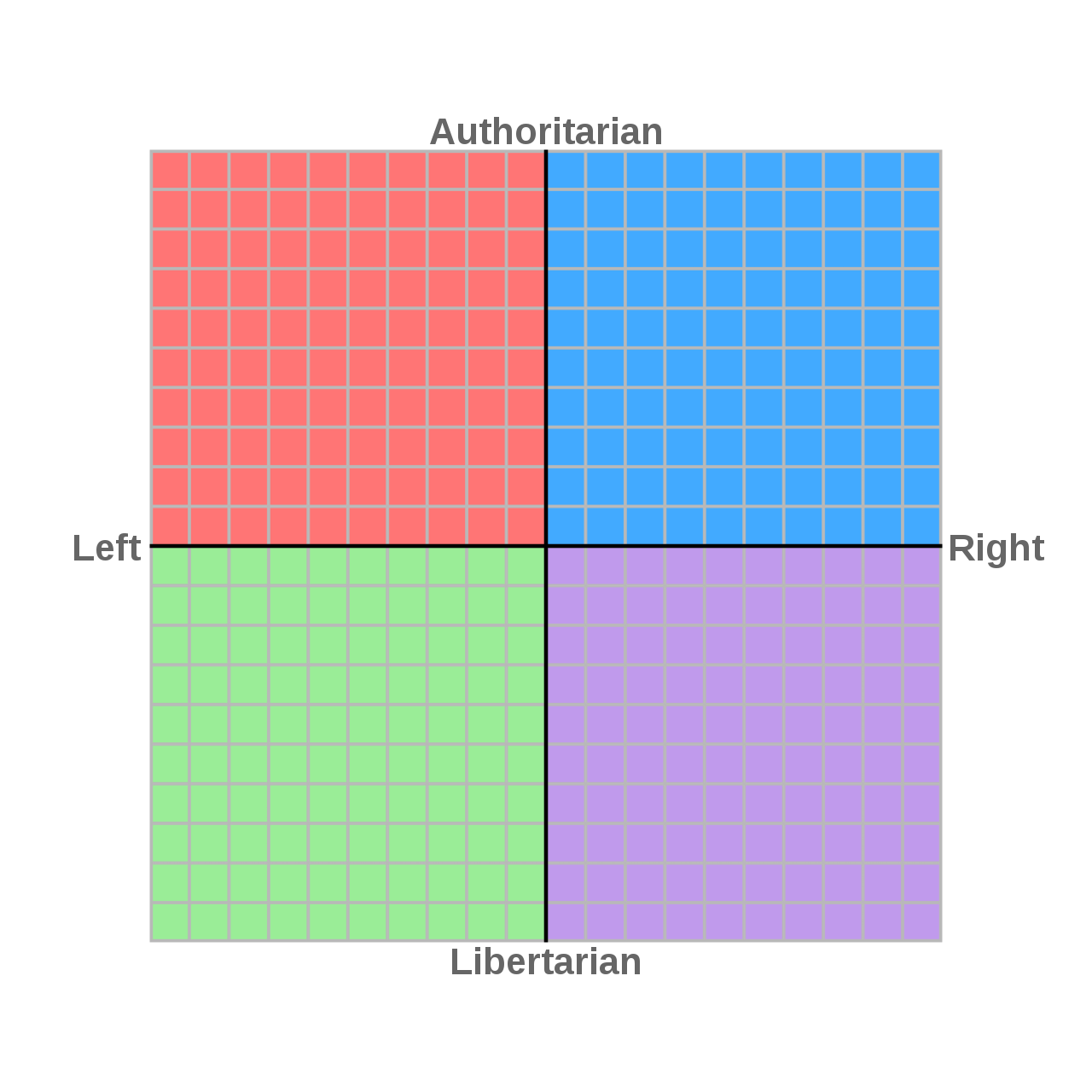 The Political Compass: the green quadrant represents left-libertarianism and the purple right-libertarianism.[81] Main article: Definition of anarchism and libertarianism Although libertarianism originated as a form of left-wing politics,[29][82] the development in the mid-20th century of modern libertarianism in the United States resulted in libertarianism's being commonly associated with right-wing politics. It also resulted in several authors and political scientists using two or more categorizations[6][7][20] to distinguish libertarian views on the nature of property and capital, usually along left–right or socialist–capitalist lines.[8] Right-libertarians reject the label due to its association with conservatism and right-wing politics, calling themselves simply libertarians, while proponents of free-market anti-capitalism in the United States consciously label themselves as left-libertarians and see themselves as being part of a broad libertarian left.[29][82] While the term libertarian has been largely synonymous with anarchism as part of the left,[14][83] continuing today as part of the libertarian left in opposition to the moderate left such as social democracy or authoritarian and statist socialism, its meaning has more recently diluted with wider adoption from ideologically disparate groups,[14] including the right.[22][33] As a term, libertarian can include both the New Left Marxists (who do not associate with a vanguard party) and extreme liberals (primarily concerned with civil liberties) or civil libertarians. Additionally, some libertarians use the term libertarian socialist to avoid anarchism's negative connotations and emphasize its connections with socialism.[14][84] The revival of free-market ideologies during the mid- to late 20th century came with disagreement over what to call the movement. While many of its adherents prefer the term libertarian, many conservative libertarians reject the term's association with the 1960s New Left and its connotations of libertine hedonism.[85] The movement is divided over the use of conservatism as an alternative.[86] Those who seek both economic and social liberty would be known as liberals, but that term developed associations opposite of the limited government, low-taxation, minimal state advocated by the movement.[87] Name variants of the free-market revival movement include classical liberalism, economic liberalism, free-market liberalism and neoliberalism.[85] As a term, libertarian or economic libertarian has the most colloquial acceptance to describe a member of the movement, with the latter term being based on both the ideology's primacy of economics and its distinction from libertarians of the New Left.[86] 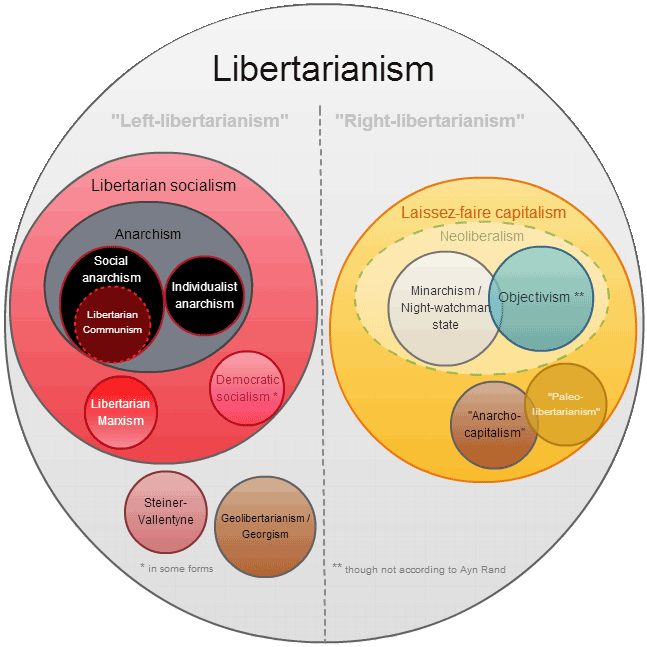 A diagram of the typology of beliefs in libertarianism (both left and right, respectively). While both historical libertarianism and contemporary economic libertarianism share general antipathy towards power by government authority, the latter exempts power wielded through free-market capitalism. Historically, libertarians including Herbert Spencer and Max Stirner supported the protection of an individual's freedom from powers of government and private ownership.[88] In contrast, while condemning governmental encroachment on personal liberties, modern American libertarians support freedoms on the basis of their agreement with private property rights.[89] The abolishment of public amenities is a common theme in modern American libertarian writings.[90] According to modern American libertarian Walter Block, left-libertarians and right-libertarians agree with certain libertarian premises, but "where [they] differ is in terms of the logical implications of these founding axioms".[91] Although several modern American libertarians reject the political spectrum, especially the left–right political spectrum,[92][93][94][95][96] several strands of libertarianism in the United States and right-libertarianism have been described as being right-wing,[97] New Right[98][99] or radical right[100][101] and reactionary.[102] While some American libertarians such as Walter Block,[91] Harry Browne,[94] Tibor Machan,[96] Justin Raimondo,[95] Leonard Read[93] and Murray Rothbard[92] deny any association with either the left or right, other American libertarians such as Kevin Carson,[29] Karl Hess,[103] and Roderick T. Long[104] have written about libertarianism's left-wing opposition to authoritarian rule and argued that libertarianism is fundamentally a left-wing position. Rothbard himself previously made the same point.[105] The Stanford Encyclopedia of Philosophy defines libertarianism as the moral view that agents initially fully own themselves and have certain moral powers to acquire property rights in external things.[20] Libertarian historian George Woodcock defines libertarianism as the philosophy that fundamentally doubts authority and advocates transforming society by reform or revolution.[106] Libertarian philosopher Roderick T. Long defines libertarianism as "any political position that advocates a radical redistribution of power from the coercive state to voluntary associations of free individuals", whether "voluntary association" takes the form of the free market or of communal co-operatives.[107] According to the American Libertarian Party, libertarianism is the advocacy of a government that is funded voluntarily and limited to protecting individuals from coercion and violence.[108] Philosophy According to the Internet Encyclopedia of Philosophy (IEP), "What it means to be a 'libertarian' in a political sense is a contentious issue, especially among libertarians themselves."[109] Nevertheless, all libertarians begin with a conception of personal autonomy from which they argue in favor of civil liberties and a reduction or elimination of the state.[4] People described as being left-libertarian or right-libertarian generally tend to call themselves simply libertarians and refer to their philosophy as libertarianism. As a result, some political scientists and writers classify the forms of libertarianism into two or more groups[6][7] to distinguish libertarian views on the nature of property and capital.[8][18] In the United States, proponents of free-market anti-capitalism consciously label themselves as left-libertarians and see themselves as being part of a broad libertarian left.[29][82] Libertarianism is a "[t]heory upholding...[individual] rights...above all else" and seeks to "reduce" the power of a state or states, especially ones a libertarian lives in or is closely associated with, to "safeguard" and maintain individualism.[110] Libertarians argue that some forms of order within society emerge spontaneously from the actions of many different individuals acting independently from one another without any central planning.[4] Proposed examples of systems which evolved through spontaneous order or self-organization include the evolution of life on Earth, language, crystal structure, the Internet, Wikipedia, workers' councils, Horizontalidad, and a free market economy.[111][112] Left-libertarianism Left-libertarianism[22][23][25] encompasses those libertarian beliefs that claim the Earth's natural resources belong to everyone in an egalitarian manner, either unowned or owned collectively.[21][24][27][28][34] Contemporary left-libertarians such as Hillel Steiner, Peter Vallentyne, Philippe Van Parijs, Michael Otsuka and David Ellerman believe the appropriation of land must leave "enough and as good" for others or be taxed by society to compensate for the exclusionary effects of private property.[21][28] Socialist libertarians[15][16][17][18] such as social and individualist anarchists, libertarian Marxists, council communists, Luxemburgists and De Leonists promote usufruct and socialist economic theories, including communism, collectivism, syndicalism and mutualism.[27][29] They criticize the state for being the defender of private property and believe capitalism entails wage slavery and another form of coercion and domination related to that of the state.[15][16][17] There are a number of different left-libertarian positions on the state, which can range from advocating for the complete abolition of the state, to advocating for a more decentralized and limited government with social ownership of the economy.[113] According to Sheldon Richman of the Independent Institute, other left-libertarians "prefer that corporate privileges be repealed before the regulatory restrictions on how those privileges may be exercised."[114] Right-libertarianism Right-libertarianism[22][25][33][34] developed in the United States in the mid-20th century from the works of European writers like John Locke, Friedrich Hayek and Ludwig Von Mises and is the most popular conception of libertarianism in the United States today.[34][74] Commonly referred to as a continuation or radicalization of classical liberalism,[115][116] the most important of these early right-libertarian philosophers was Robert Nozick.[34][74][77] While sharing left-libertarians' advocacy for social freedom, right-libertarians value the social institutions that enforce conditions of capitalism while rejecting institutions that function in opposition to these on the grounds that such interventions represent unnecessary coercion of individuals and abrogation of their economic freedom.[117] Anarcho-capitalists[25][33] seek the elimination of the state in favor of privately funded security services while minarchists defend night-watchman states which maintain only those functions of government necessary to safeguard natural rights, understood in terms of self-ownership or autonomy.[47] Libertarian paternalism[118] is a position advocated in the international bestseller Nudge by two American scholars, namely the economist Richard Thaler and the jurist Cass Sunstein.[119] In the book Thinking, Fast and Slow, Daniel Kahneman provides the brief summary: "Thaler and Sunstein advocate a position of libertarian paternalism, in which the state and other institutions are allowed to nudge people to make decisions that serve their own long-term interests. The designation of joining a pension plan as the default option is an example of a nudge. It is difficult to argue that anyone's freedom is diminished by being automatically enrolled in the plan, when they merely have to check a box to opt out".[120] Nudge is considered an important piece of literature in behavioral economics.[120] Neo-libertarianism combines "the libertarian's moral commitment to negative liberty with a procedure that selects principles for restricting liberty on the basis of a unanimous agreement in which everyone's particular interests receive a fair hearing".[121] Neo-libertarianism has its roots at least as far back as 1980, when it was first described by the American philosopher James Sterba of the University of Notre Dame. Sterba observed that libertarianism advocates for a government that does no more than protection against force, fraud, theft, enforcement of contracts and other negative liberties as contrasted with positive liberties by Isaiah Berlin.[122] Sterba contrasted this with the older libertarian ideal of a night watchman state, or minarchism. Sterba held that it is "obviously impossible for everyone in society to be guaranteed complete liberty as defined by this ideal: after all, people's actual wants as well as their conceivable wants can come into serious conflict. [...] [I]t is also impossible for everyone in society to be completely free from the interference of other persons".[123] In 2013, Sterna wrote that "I shall show that moral commitment to an ideal of 'negative' liberty, which does not lead to a night-watchman state, but instead requires sufficient government to provide each person in society with the relatively high minimum of liberty that persons using Rawls' decision procedure would select. The political program actually justified by an ideal of negative liberty I shall call Neo-Libertarianism".[124] Libertarian populism combines libertarian and populist politics. According to Jesse Walker, writing in the libertarian magazine Reason, libertarian populists oppose "big government" while also opposing "other large, centralized institutions" and advocate "tak[ing] an axe to the thicket of corporate subsidies, favors, and bailouts, clearing our way to an economy where businesses that can't make money serving customers don't have the option of wringing profits from the taxpayers instead."[125] Typology  The Nolan Chart, created by American libertarian David Nolan, expands the left–right line into a two-dimensional chart classifying the political spectrum by degrees of personal and economic freedom In the United States, libertarian is a typology used to describe a political position that advocates small government and is culturally liberal and fiscally conservative in a two-dimensional political spectrum such as the libertarian-inspired Nolan Chart, where the other major typologies are conservative, liberal and populist.[78][126][127][128] Libertarians support legalization of victimless crimes such as the use of marijuana while opposing high levels of taxation and government spending on health, welfare and education.[78] Libertarians also support a foreign policy of non-interventionism.[129][130] Libertarian was adopted in the United States, where liberal had become associated with a version that supports extensive government spending on social policies.[72] Libertarian may also refer to an anarchist ideology that developed in the 19th century and to a liberal version which developed in the United States that is avowedly pro-capitalist.[21][22][25] According to polls, approximately one in four Americans self-identify as libertarian.[131][132][133][134] While this group is not typically ideologically driven, the term libertarian is commonly used to describe the form of libertarianism widely practiced in the United States and is the common meaning of the word libertarianism in the United States.[34] This form is often named liberalism elsewhere such as in Europe, where liberalism has a different common meaning than in the United States.[72] In some academic circles, this form is called right-libertarianism as a complement to left-libertarianism, with acceptance of capitalism or the private ownership of land as being the distinguishing feature.[21][22][25] |
語源 1860年8月17日、ニューヨークのリバタリアン共産主義出版物『Le Libertaire, Journal du mouvement social』(社会運動ジャーナル)。 リバタリアンという用語の最初の使用は1789年で、ウィリアム・ベルシャムが形而上学の文脈でリバタリアニズムについて書いた[59]。早くも1796 年には、リバタリアンは、特に政治的・社会的領域における自由の擁護者または擁護者を意味するようになった: 「1802年に「ゲビールの作者」の詩を批評する短い文章で再び政治的な意味で使われ、それ以来この意味で使われている[61][62][63]。 新しい一連の政治的立場を表現するためにリバタリアンという用語が使われるようになったのは、1857年にフランスのリバタリアン共産主義者ジョセフ・デ ジャックが相互主義者ピエール=ジョセフ・プルードンに宛てた手紙の中で作られたフランス語の同義語libertaireまで遡ることができる[64]。 [セバスチャン・フォール(Sébastien Faure)もまたフランスのリバタリアン共産主義者であり、1890年代半ばに新たなル・リベルテールを発行し始めたが、その一方でフランス第三共和政 はいわゆる悪法(lois scélérates)を制定し、フランスで無政府主義者の出版物を禁止した。リバタリアニズムはこの時代以降、アナーキズムやリバタリアン社会主義を指 す言葉として頻繁に使われている[66][67][68]。 アメリカでは、リバタリアンは1870年代後半から1880年代前半にかけて、個人主義的なアナキストであるベンジャミン・タッカーによって広められた [69]。リベラリズムの同義語としてのリバタリアニズムは、1955年5月にレナード・リードの同僚であり、自身も古典的なリベラル派であった作家の ディーン・ラッセルによって広められた。ラッセルはこの言葉の選択を次のように正当化した: 私たちの多くは自らを "リベラル "と呼ぶ。かつて "リベラル "という言葉が、個人を尊重し、集団による強制を恐れた人々を表していたのは事実だ。しかし、左派は今や、かつては誇らしげだったこの言葉を、自分たち自 身と、政府による財産所有の拡大や個人に対する管理強化という彼らのプログラムを示すために堕落させてしまった。その結果、自由を信じる私たちは、私たち がリベラルと名乗るときは、堕落していない古典的な意味でのリベラルを意味すると説明しなければならなくなった。よく言えば、これは厄介で誤解を招きやす い。そこで提案だ: 自由を愛する私たちは、「リバタリアン」[70][71][72]という善良で名誉ある言葉をトレードマークとし、自分たちの使用のために留保しよう。 その後、古典的なリベラルの信条を持つアメリカ人の多くが、自らをリバタリアンだと表現するようになった。このような意味でのリバタリアンという言葉を一 般に広めた張本人の一人が、1960年代にリバタリアン的著作を発表し始めたマレー・ロスバードである[73]。ロスバードはこの言葉の現代的な使用を敵 からの「奪取」と表現し、「私の記憶の中で初めて、我々『こちら側』は敵から重要な言葉を奪取した」と書いている。リバタリアン』は長い間、単に左翼ア ナーキスト、つまり共産主義者やシンジカリストのような反私有財産のアナーキストを指す丁寧な言葉だった。しかし、今や我々はそれを引き継いでいる」 [13]。 1970年代において、ロバート・ノージックは、特に社会的自由主義者であるジョン・ロールズの『正義の理論』(1971年)に対する反論である『アナー キー、国家、ユートピア』(1974年)の出版によって、アメリカ以外の学術界や哲学界においてこの用語の用法を一般化する役割を担っていた[34] [74][75]。 アメリカ合衆国の保守とリベラルの一般的な意味によれば、アメリカ合衆国のリバタリアニズムは経済問題については保守的(経済自由主義や財政保守主義)で あり、個人の自由については自由主義(市民的リバタリアニズムや文化的自由主義)であるとされている[78]。また不介入主義の外交政策と関連しているこ とが多い[79][80]。 定義 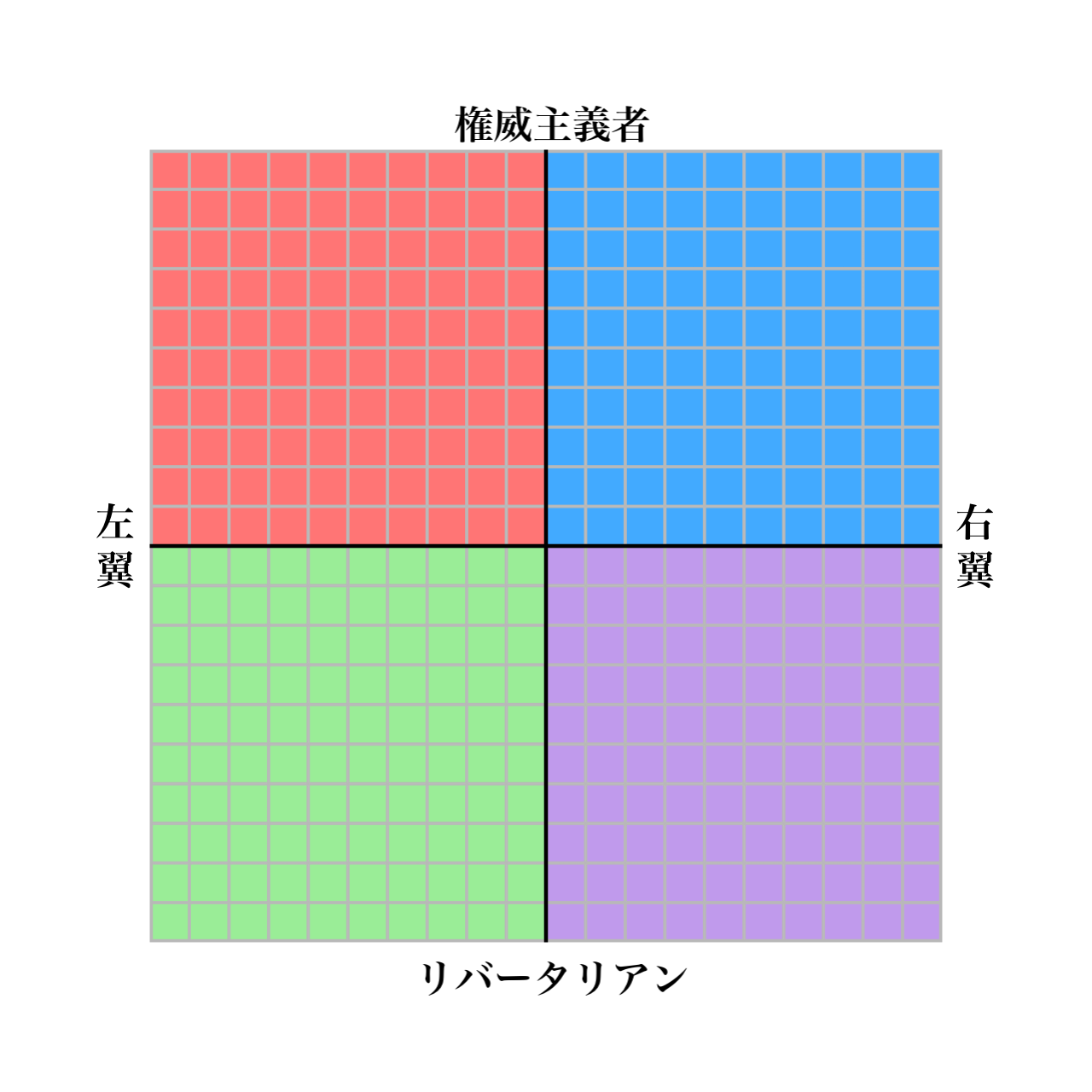 政治コンパス:緑の象限は左リバタリアニズム、紫の象限は右リバタリアニズムを表す[81]。 主な記事 アナキズムとリバタリアニズムの定義 リバタリアニズムは左翼政治の一形態として発祥したが[29][82]、20世紀半ばにアメリカにおいて近代的なリバタリアニズムが発展した結果、リバタ リアニズムは一般的に右翼政治と結び付けられるようになった。また、財産と資本の性質に関するリバタリアンの見解を区別するために、複数の著者や政治学者 が2つ以上の分類[6][7][20]を用いる結果となり、通常は左派-右派または社会主義-資本主義の線に沿っている。 [8]右派リバタリアンは保守主義や右翼政治との関連性からこのレッテルを拒否し、自らを単にリバタリアンと呼ぶが、アメリカにおける自由市場主義的な反 資本主義の支持者は意識的に自らを左派リバタリアンと呼び、自らを広範なリバタリアン左派の一部であると見なしている[29][82]。 リバタリアンという用語は左派の一部としてのアナーキズムとほぼ同義であり[14][83]、社会民主主義や権威主義的・国家主義的社会主義などの穏健な 左派に対抗するリバタリアン左派の一部として今日も続いているが、その意味は最近、右派を含むイデオロギー的に異質なグループ[14]から広く採用される につれて希薄化している。 [22][33]用語として、リバタリアンは新左翼マルクス主義者(前衛党とは関係しない)と極端な自由主義者(主に市民的自由を重視する)または市民的 自由主義者の両方を含むことができる。さらに、アナーキズムの否定的な意味合いを避け、社会主義とのつながりを強調するためにリバタリアン社会主義者とい う用語を使用するリバタリアンもいる[14][84]。 20世紀半ばから後半にかけての自由市場イデオロギーの復活は、この運動を何と呼ぶべきかをめぐる意見の対立を伴った。多くの信奉者はリバタリアンという 用語を好むが、多くの保守的なリバタリアンはこの用語が1960年代の新左翼と結びついたり、自由主義的な快楽主義を意味したりすることを拒絶している [85]。この運動は代替としての保守主義の使用をめぐって意見が分かれている[86]。 経済的自由と社会的自由の両方を求める人々はリベラルとして知られているが、この用語はこの運動が提唱する限定政府、低税、最小国家とは反対の連想を発展 させた。 [87]自由市場復興運動の名称の変種には、古典的自由主義、経済的自由主義、自由市場自由主義、新自由主義が含まれる[85]。用語としては、リバタリ アンまたは経済的リバタリアンがこの運動のメンバーを表すのに最も口語的に受け入れられており、後者の用語はイデオロギーの経済学の優位性と新左翼のリバ タリアンとの区別の両方に基づくものである[86]。  リバタリアニズムにおける信念の類型図(それぞれ左派と右派の両方)。 歴史的リバタリアニズムも現代の経済的リバタリアニズムも、政府権力による権力に対する一般的な反感を共有しているが、後者は自由市場資本主義を通じて行 使される権力を除外している。歴史的には、ハーバート・スペンサーやマックス・シュティルナーを含むリバタリアンは、政府の権力や私的所有権から個人の自 由を保護することを支持していた[88]。対照的に、個人の自由に対する政府の侵害を非難する一方で、現代のアメリカのリバタリアンは私有財産権への同意 に基づいて自由を支持している[89]。 公共施設の廃止は現代のアメリカのリバタリアンの著作における共通のテーマである[90]。 現代アメリカのリバタリアンであるウォルター・ブロックによれば、左派リバタリアンと右派リバタリアンはある種のリバタリアンの前提に同意しているが、 「(彼らが)異なるのは、これらの創設の公理の論理的含意の点である」。 [91]現代のアメリカのリバタリアンの何人かは政治的スペクトラム、特に左右の政治的スペクトラムを否定しているが[92][93][94][95] [96]、アメリカにおけるリバタリアニズムのいくつかの潮流や右リバタリアニズムは右翼的[97]、新右翼的[98][99]、あるいは急進的右翼的 [100][101]、反動的であると評されてきた。 [102]ウォルター・ブロック、[91]ハリー・ブラウン、[94]ティボール・マチャン、[96]ジャスティン・ライモンド、[95]レナード・リー ド、[93]マレー・ロスバード[92]のようなアメリカのリバタリアンの中には左派や右派との関連を否定する者もいるが、ケヴィン・カーソン、[29] カール・ヘス、[103]ロデリック・T. Long[104]は、リバタリアニズムが権威主義的な支配に反対する左翼的な立場であることについて書いており、リバタリアニズムは基本的に左翼的な立 場であると主張している。ロスバード自身も以前同じ指摘をしていた[105]。 スタンフォード哲学百科事典(Stanford Encyclopedia of Philosophy)』はリバタリアニズムを、当初は主体が完全に自分自身を所有し、外的なものに対して所有権を獲得する一定の道徳的な力を持つという 道徳的な見解であると定義している[20]。 リバタリアンの歴史家であるジョージ・ウッドコックはリバタリアニズムを、根本的に権威を疑い、改革や革命によって社会を変革することを提唱する哲学であ ると定義している[106]。ロングはリバタリアニズムを「強制的な国家から自由な個人の自発的な団体への権力の根本的な再分配を提唱するあらゆる政治的 立場」と定義しており、「自発的な団体」が自由市場や共同協同組合の形態をとるかどうかは問わない[107]。 アメリカのリバタリアン党によれば、リバタリアニズムとは、自発的に資金を調達し、強制や暴力から個人を保護することに限定された政府の提唱である [108]。 哲学 Internet Encyclopedia of Philosophy (IEP)によれば、「政治的な意味において『リバタリアン』であることが何を意味するかは、特にリバタリアン自身の間で論争の的となっている」 [109]にもかかわらず、すべてのリバタリアンは個人の自律性の概念から出発し、そこから市民的自由と国家の縮小または撤廃を支持する主張を行う。その 結果、一部の政治学者や作家は、財産や資本の性質に関するリバタリアンの見解を区別するために、リバタリアニズムの形態を2つ以上のグループ[6][7] に分類している[8][18]。アメリカでは、自由市場主義的な反資本主義の支持者は、意識的に自らを左リバタリアンと表示し、自らを広範なリバタリアン 左派の一部であるとみなしている[29][82]。 リバタリアニズムは「...(個人の)権利を...何よりも支持する理論」であり、個人主義を「保護」し維持するために、国家または国家、特にリバタリアンが住んでいる、または密接に関係している国家の力を「削減」しようとするものである[110]。 リバタリアンは、社会内の秩序のいくつかの形態は、中央の計画なしに互いに独立して行動する多くの異なる個人の行動から自然発生的に生まれると主張してい る[4]。自然発生的な秩序や自己組織化によって進化したシステムの例として、地球上の生命の進化、言語、結晶構造、インターネット、ウィキペディア、労 働者評議会、ホリゾンタリッド、自由市場経済などが提案されている[111][112]。 左リバタリアニズム 左リバタリアニズム[22][23][25]は、地球の自然資源は平等主義的な方法で、所有されていないか集団的に所有されているかのいずれかで、すべて の人に属していると主張するリバタリアンの信念を包含している。 [21][24][27][28][34]ヒレル・シュタイナー、ピーター・ヴァレンティン、フィリップ・ヴァン・パリイス、マイケル・大塚、デイヴィッ ド・エラーマンといった現代の左翼リバタリアンたちは、土地の充当は「十分かつ善良な」他の人々のために残されなければならない、あるいは私有財産の排他 的効果を補償するために社会によって課税されなければならないと考えている。 [21][28]社会主義的自由主義者[15][16][17][18]例えば、社会的・個人主義的アナーキスト、自由主義的マルクス主義者、評議会共産 主義者、ルクセンブルク主義者、デ・レオニストなどは、用益権および共産主義、集団主義、シンジカリズム、相互主義を含む社会主義的経済理論を推進してい る。 [27][29]彼らは私有財産の擁護者である国家を批判し、資本主義は賃金奴隷制と国家のそれに関連する別の形態の強制と支配を伴うと考えている。 国家に対する左派リバタリアンの立場には様々なものがあり、国家の完全な廃止を主張するものから、経済の社会的所有を伴うより分権化された限定的な政府を 主張するものまで様々である[113]。独立研究所のシェルドン・リッチマンによれば、他の左派リバタリアンは「企業特権が、それらの特権をどのように行 使することができるかについての規制的制限よりも先に廃止されることを好む」[114]。 右リバタリアニズム 右派リバタリアニズム[22][25][33][34]は、ジョン・ロック、フリードリヒ・ハイエク、ルートヴィヒ・フォン・ミーゼスのようなヨーロッパ の作家の著作から20世紀半ばにアメリカで発展したものであり、今日アメリカで最も人気のあるリバタリアニズムの概念である[34][74]。一般に古典 的自由主義の継続または急進化と呼ばれ[115][116]、これらの初期の右派リバタリアンの哲学者の中で最も重要なのはロバート・ノージックであっ た。 [34][74][77]左派自由主義者の社会的自由の擁護を共有する一方で、右派自由主義者は資本主義の条件を強制する社会制度を重視する一方で、その ような介入は個人に対する不必要な強制と経済的自由の剥奪を意味するという理由で、これらに反対して機能する制度を拒絶している。 [117]アナルコ資本主義者[25][33]は、民間の資金による安全保障サービスを支持して国家の廃止を求める一方で、ミニマリストは、自己所有権や 自律性の観点から理解される自然権を保護するために必要な政府の機能のみを維持する夜警国家を擁護する[47]。 リバタリアン・パターナリズム[118]は、2人のアメリカの学者、すなわち経済学者のリチャード・ターラーと法学者のキャス・サンスティーンによる世界 的ベストセラー『ナッジ』の中で提唱された立場である。 ダニエル・カーネマンは『Thinking, Fast and Slow』という本の中で、次のように簡潔にまとめている。年金制度への加入を既定の選択肢とすることは、後押しの一例である。ナッジは行動経済学の重要 な文献のひとつと考えられている[120]。 新リバタリアニズムは、「否定的な自由に対するリバタリアンの道徳的コミットメントと、自由を制限するための原則を、すべての人の特定の利益が公平に審理 される全員一致の合意に基づいて選択する手続き」とを結合している[121]。ステルバは、リバタリアニズムが、アイザイア・バーリンによる積極的自由と 対比されるように、武力、詐欺、窃盗、契約の執行、その他の消極的自由からの保護以上のことをしない政府を提唱していると観察した。ステルバは、「この理 想によって定義されるような完全な自由を社会の全員が保証されることは明らかに不可能である。[結局のところ、人々は実際の欲望と考えられる欲望とが深刻 な衝突を起こしうるのである」[123]。2013年、ステルナは「『否定的な』自由の理想に道徳的にコミットすることは、夜警国家につながるのではな く、ロールズの決定手続きを用いる人々が選択するであろう比較的高い最低限の自由を社会の各人に提供するのに十分な政府を必要とすることを示そう」と書い ている。否定的自由の理想によって実際に正当化される政治プログラムを、私はネオ・リバタリアニズムと呼ぶことにする」[124]。 リバタリアン・ポピュリズムはリバタリアン政治とポピュリスト政治を組み合わせたものである。リバタリアン雑誌『リーズン』に寄稿しているジェシー・ ウォーカーによれば、リバタリアン・ポピュリストは「大きな政府」に反対すると同時に、「他の中央集権的な大きな制度」にも反対し、「企業補助金、便宜供 与、救済の藪に斧を入れ、顧客に奉仕しても儲からない企業が、代わりに納税者から利益を搾り取るという選択肢を持たない経済への道を切り開く」ことを提唱 している[125]。 類型  アメリカのリバタリアン、デビッド・ノーランが作成したノーラン・チャートは、左右の線を2次元のチャートに拡大し、政治スペクトルを個人的・経済的自由の度合いによって分類したものである。 アメリカでは、リバタリアンは小さな政府を提唱し、文化的にリベラルで財政的に保守的な政治的立場を表すために用いられる類型であり、リバタリアンにイン スパイアされたノーラン・チャートのような2次元の政治的スペクトルでは、他の主要な類型は保守、リベラル、ポピュリストである[78][126] [127][128] リバタリアンはマリファナの使用のような被害者のいない犯罪の合法化を支持する一方で、高水準の課税と医療、福祉、教育への政府支出に反対している。 [リバタリアンはまた、不介入主義の外交政策を支持する[129][130]。リバタリアンは、リベラルが社会政策への広範な政府支出を支持するバージョ ンと関連付けられていた米国で採用された[72]。リバタリアンはまた、19世紀に発展した無政府主義イデオロギーや、公然と資本主義を支持する米国で発 展したリベラルバージョンを指すこともある[21][22][25]。 世論調査によれば、アメリカ人のおよそ4人に1人がリバタリアンであると自認している[131][132][133][134]。このグループは典型的に はイデオロギーに基づくものではないが、リバタリアンという用語はアメリカで広く実践されているリバタリアニズムの形態を表すのに一般的に使用されてお り、アメリカにおけるリバタリアニズムという言葉の一般的な意味である。 [このような形態は、リベラリズムがアメリカ合衆国とは異なる一般的な意味を持つヨーロッパなど、他の地域ではしばしばリベラリズムと名付けられる [34]。学界の一部では、この形態は左リバタリアニズムを補完するものとして右リバタリアニズムと呼ばれ、資本主義や土地の私有権の受容が際立った特徴 となっている[21][22][25]。 |
History of liberalism John Locke, regarded as the father of liberalism Elements of libertarianism can be traced back to the higher-law concepts of the Greeks and the Israelites, and Christian theologians who argued for the moral worth of the individual and the division of the world into two realms, one of which is the province of God and thus beyond the power of states to control it.[4][135] The right-libertarian economist Murray Rothbard suggested that Chinese Taoist philosopher Laozi was the first libertarian,[136] likening Laozi's ideas on government to Friedrich Hayek's theory of spontaneous order.[137] Similarly, the Cato Institute's David Boaz includes passages from the Tao Te Ching in his 1997 book The Libertarian Reader and noted in an article for the Encyclopædia Britannica that Laozi advocated for rulers to "do nothing" because "without law or compulsion, men would dwell in harmony."[138] Libertarianism was influenced by debates within Scholasticism regarding private property and slavery.[4] Scholastic thinkers, including Thomas Aquinas, Francisco de Vitoria, and Bartolomé de Las Casas, argued for the concept of "self-mastery" as the foundation of a system supporting individual rights.[4] Early Christian sects such as the Waldensians displayed libertarian attitudes.[139][140] In 17th-century England, libertarian ideas began to take modern form in the writings of the Levellers and John Locke. In the middle of that century, opponents of royal power began to be called Whigs, or sometimes simply Opposition or Country, as opposed to Court writers.[141] During the 18th century and Age of Enlightenment, liberal ideas flourished in Europe and North America.[142][143] Libertarians of various schools were influenced by liberal ideas.[9] For philosopher Roderick T. Long, libertarians "share a common—or at least an overlapping—intellectual ancestry. [Libertarians] [...] claim the seventeenth century English Levellers and the eighteenth century French Encyclopedists among their ideological forebears; and [...] usually share an admiration for Thomas Jefferson and Thomas Paine".[144] 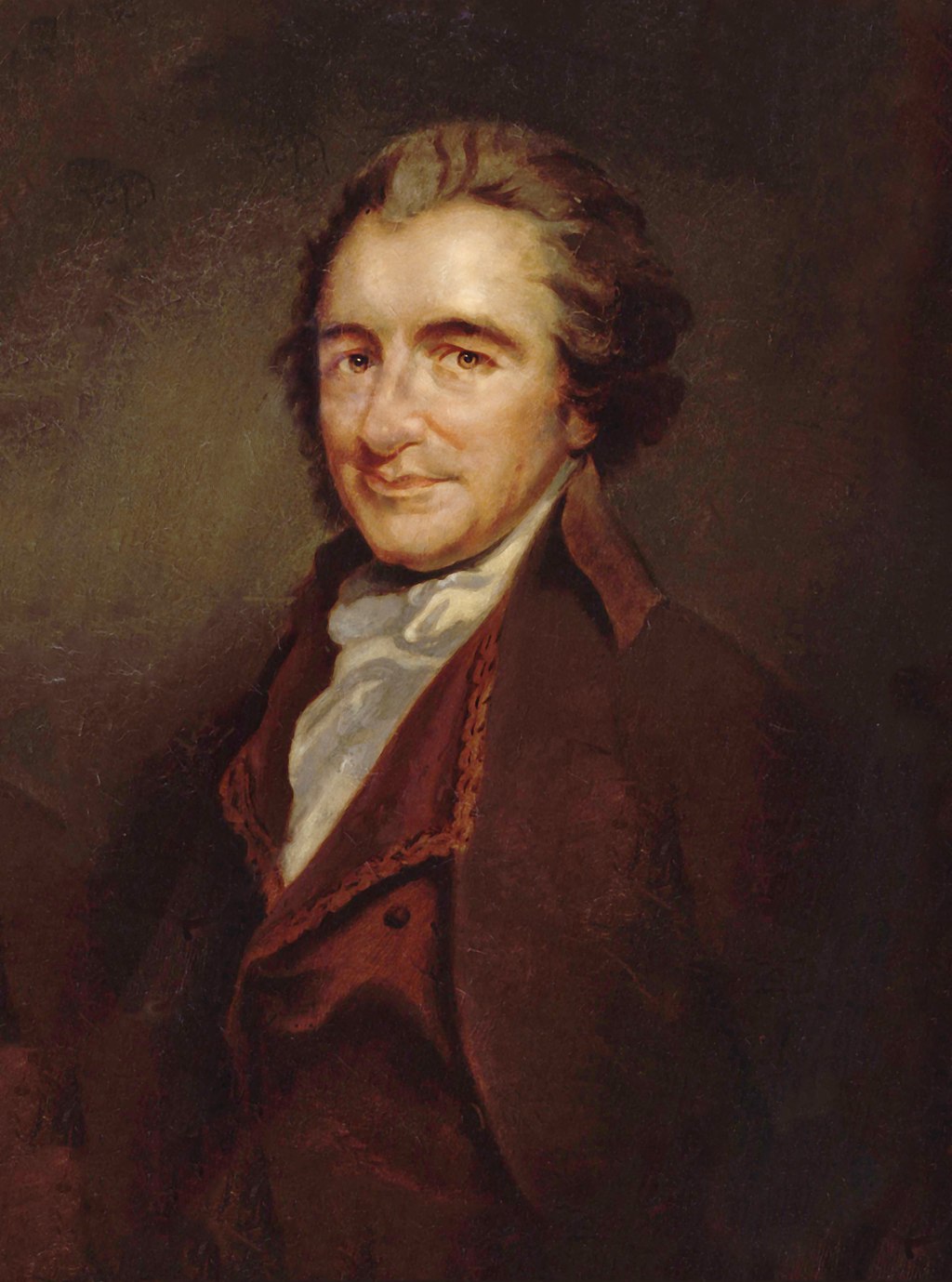 Thomas Paine, whose theory of property showed a libertarian concern with the redistribution of resources John Locke greatly influenced both libertarianism and the modern world in his writings published before and after the English Revolution of 1688, especially A Letter Concerning Toleration (1667), Two Treatises of Government (1689) and An Essay Concerning Human Understanding (1690). In the text of 1689, he established the basis of liberal political theory, i.e. that people's rights existed before government; that the purpose of government is to protect personal and property rights; that people may dissolve governments that do not do so; and that representative government is the best form to protect rights.[145] The United States Declaration of Independence was inspired by Locke in its statement: "[T]o secure these rights, Governments are instituted among Men, deriving their just powers from the consent of the governed. That whenever any Form of Government becomes destructive of these ends, it is the Right of the People to alter or to abolish it".[146] According to American historian Bernard Bailyn, during and after the American Revolution, "the major themes of eighteenth-century libertarianism were brought to realization" in constitutions, bills of rights, and limits on legislative and executive powers, including limits on starting wars.[4] According to Murray Rothbard, the libertarian creed emerged from the liberal challenges to an "absolute central State and a king ruling by divine right on top of an older, restrictive web of feudal land monopolies and urban guild controls and restrictions" as well as the mercantilism of a bureaucratic warfaring state allied with privileged merchants. The object of liberals was individual liberty in the economy, in personal freedoms and civil liberty, separation of state and religion and peace as an alternative to imperial aggrandizement. He cites Locke's contemporaries, the Levellers, who held similar views. Also influential were the English Cato's Letters during the early 1700s, reprinted eagerly by American colonists who already were free of European aristocracy and feudal land monopolies.[146] In January 1776, only two years after coming to America from England, Thomas Paine published his pamphlet Common Sense calling for independence for the colonies.[147] Paine promoted liberal ideas in clear and concise language that allowed the general public to understand the debates among the political elites.[148] Common Sense was immensely popular in disseminating these ideas,[149] selling hundreds of thousands of copies.[150] Paine would later write the Rights of Man and The Age of Reason and participate in the French Revolution.[147] Paine's theory of property showed a "libertarian concern" with the redistribution of resources.[151] In 1793, William Godwin wrote a libertarian philosophical treatise titled Enquiry Concerning Political Justice and its Influence on Morals and Happiness which criticized ideas of human rights and of society by contract based on vague promises. He took liberalism to its logical anarchic conclusion by rejecting all political institutions, law, government and apparatus of coercion as well as all political protest and insurrection. Instead of institutionalized justice, Godwin proposed that people influence one another to moral goodness through informal reasoned persuasion, including in the associations they joined as this would facilitate happiness.[152] |
自由主義の歴史 自由主義の父とされるジョン・ロック リバタリアニズムの要素は、ギリシア人やイスラエル人の高次法の概念や、個人の道徳的価値や世界を2つの領域に分割することを主張したキリスト教の神学者 たちにまで遡ることができる。 [右派リバタリアンの経済学者であるマレー・ロスバードは、中国の道教の哲学者である老子が最初のリバタリアンであると示唆し[136]、老子の政府に対 する考え方をフリードリヒ・ハイエクの自然発生的秩序論になぞらえた。 同様に、ケイトー研究所のデイヴィッド・ボアズは1997年に出版した『リバタリアン読本』の中で『道経』の一節を引用しており、ブリタニカ百科事典への 寄稿では、老子は「法律や強制がなければ、人間は調和して暮らすことができる」ため、支配者は「何もしない」ことを提唱していると述べている[137]。 「トマス・アクィナス、フランシスコ・デ・ヴィトーリア、バルトロメ・デ・ラス・カサスなどのスコラ派の思想家は、個人の権利を支えるシステムの基礎とし て「自己支配」の概念を主張した[4]。 ワルデン派のような初期のキリスト教の宗派はリバタリアン的な態度を示していた[139][140]。 17世紀のイギリスでは、リバタリアンの思想はレヴェラーやジョン・ロックの著作の中で近代的な形を取り始めた。その世紀の中頃には、王権に反対する者た ちはホイッグと呼ばれ始め、宮廷の作家たちとは対照的に、単に野党やカントリーと呼ばれることもあった[141]。 18世紀と啓蒙の時代にはヨーロッパと北米で自由主義思想が隆盛した[142][143]。 哲学者のロデリック・T・ロングにとって、リバタリアンは「共通の、あるいは少なくとも重なり合う知的祖先を共有している。[リバタリアンは)17世紀の イギリスのレヴェラーや18世紀のフランスの百科全書主義者を思想的先祖に持ち、(中略)通常、トマス・ジェファーソンやトマス・ペインに対する賞賛を共 有している」[144]。  トマス・ペインの財産論は、資源の再分配に対するリバタリアンの関心を示していた。 ジョン・ロックは、1688年のイギリス革命の前後に出版された著作、特に『寛容に関する書簡』(1667年)、『政府二論』(1689年)、『人間理解 に関する試論』(1690年)において、リバタリアニズムと現代世界の両方に大きな影響を与えた。1689年の文章において、彼は自由主義政治理論の基礎 を確立した。すなわち、人々の権利は政府以前に存在し、政府の目的は個人的権利と財産権を保護することであり、人々はそうしない政府を解散させることがで き、代議制政府が権利を保護するための最良の形態であるということである[145]。 アメリカ合衆国の独立宣言は、その声明においてロックに影響を受けている: 「これらの権利を確保するために、政府は人間の間に設立され、被治者の同意から正当な権力を得る。アメリカの歴史家バーナード・ベイリンによれば、アメリ カ独立戦争の間とその後に、「18世紀のリバタリアニズムの主要なテーマは、憲法、権利章典、戦争開始の制限を含む立法権と行政権の制限において実現され た」[4]。 マレー・ロスバードによれば、リバタリアンの信条は、「封建的な土地の独占と都市ギルドの統制と制限という、より古い制限的な網の目の上に、絶対的な中央 国家と神の権利によって統治される王」、また特権的な商人と同盟を結んだ官僚的な戦争国家の重商主義に対する自由主義者の挑戦から生まれた。リベラルの目 的は、経済における個人の自由、個人の自由と市民的自由、国家と宗教の分離、そして帝国的拡大主義に代わる平和であった。ロックの同時代人であるレヴェ ラーズも同様の考えを持っていた。また、1700年代初頭のイギリスの『ケイトーの手紙』にも影響力があり、ヨーロッパの貴族制や封建的な土地の独占から すでに自由になっていたアメリカの植民地主義者たちによって熱心に再版された[146]。 1776年1月、イギリスからアメリカに来てからわずか2年後、トマス・ペインは植民地の独立を呼びかける小冊子『コモン・センス』を出版した [147]。 [148]コモン・センスはこれらの思想を広める上で絶大な人気を博し、[149]何十万部も売れた。[150]ペインは後に『人間の権利』と『理性の時 代』を書き、フランス革命に参加することになる。 1793年、ウィリアム・ゴドウィンは『Enquiry Concerning Political Justice and its Influence on Morals and Happiness(政治的正義とその道徳と幸福への影響に関する探究)』というタイトルの自由主義的な哲学論文を書き、人権や曖昧な約束に基づく契約に よる社会の考えを批判した。彼は、すべての政治制度、法律、政府、強制装置、そしてすべての政治的抗議や暴動を否定することで、自由主義を論理的に無政府 的な結論へと導いた。制度化された正義の代わりに、ゴドウィンは、人々が幸福を促進するために加入する団体を含め、非公式な理性的説得を通じて道徳的善良 さに影響を与え合うことを提案した[152]。 |
| Libertarian socialism (1857–1980s) Anarchist communist philosopher Joseph Déjacque was the first person to describe himself as a libertarian[10] in an 1857 letter.[153] Unlike mutualist anarchist philosopher Pierre-Joseph Proudhon, he argued that "it is not the product of his or her labor that the worker has a right to, but to the satisfaction of his or her needs, whatever may be their nature".[154][155] According to anarchist historian Max Nettlau, the first use of the term libertarian communism was in November 1880, when a French anarchist congress employed it to identify its doctrines more clearly.[156] The French anarchist journalist Sébastien Faure started the weekly paper Le Libertaire (The Libertarian) in 1895.[157] 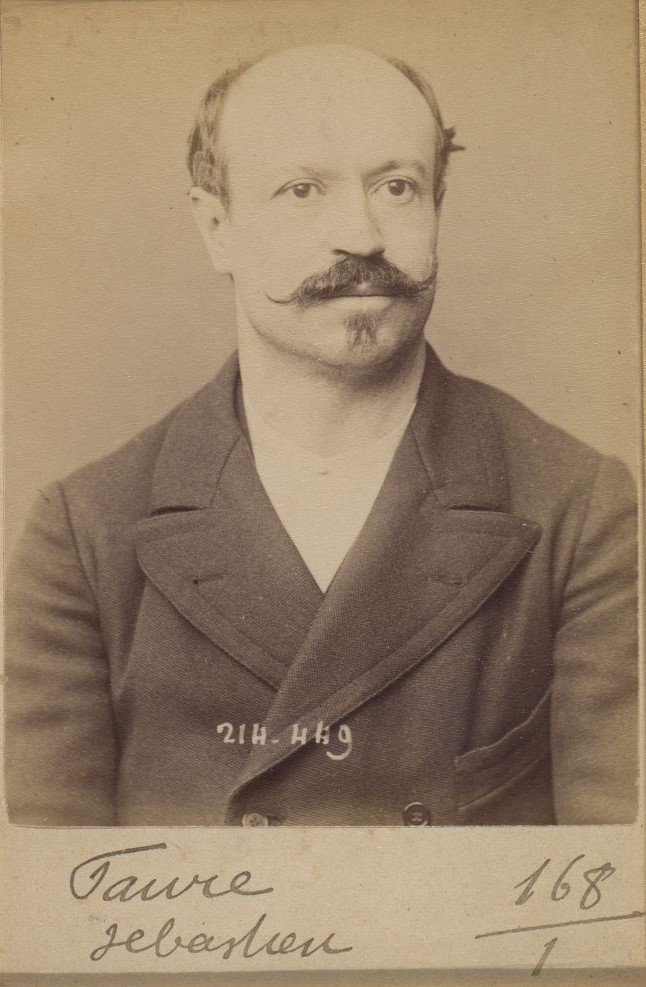 Sébastien Faure, prominent French theorist of libertarian communism as well as atheist and freethought militant The revolutionary wave of 1917–1923 saw the active participation of anarchists in Russia and Europe. Russian anarchists participated alongside the Bolsheviks in both the February and October 1917 revolutions. However, Bolsheviks in central Russia quickly began to imprison or drive underground the libertarian anarchists. Many fled to Ukraine,[158] where they fought for the Makhnovshchina in the Russian Civil War against the White movement, monarchists and other opponents of revolution and then against Bolsheviks as part of the Revolutionary Insurgent Army of Ukraine led by Nestor Makhno, who established an anarchist society in the region. The victory of the Bolsheviks damaged anarchist movements internationally as workers and activists joined Communist parties. In France and the United States, for example, members of the major syndicalist movements of the CGT and IWW joined the Communist International.[159] With the rise of fascism in Europe between the 1920s and the 1930s, anarchists began to fight fascists in Italy,[160] in France during the February 1934 riots[161] and in Spain where the CNT (Confederación Nacional del Trabajo) boycott of elections led to a right-wing victory and its later participation in voting in 1936 helped bring the popular front back to power. This led to a ruling class attempted coup and the Spanish Civil War (1936–1939).[162] Gruppo Comunista Anarchico di Firenze held that during the early twentieth century, the terms libertarian communism and anarchist communism became synonymous within the international anarchist movement as a result of the close connection they had in Spain (anarchism in Spain), with libertarian communism becoming the prevalent term.[163] 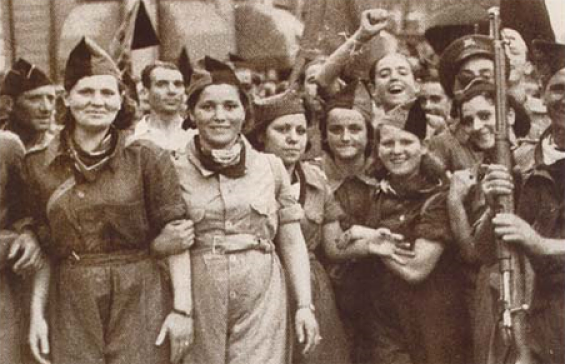 Spanish anarchist militiawomen during the 1936 Revolution Libertarian socialism reached its apex of popularity with the Spanish Revolution of 1936, during which libertarian socialists led "the largest and most successful revolution against capitalism to ever take place in any industrial economy".[164] During the revolution, the means of production were brought under workers' control and worker cooperatives formed the basis for the new economy.[165] According to Gaston Leval, the CNT established an agrarian federation in the Levante that encompassed 78% of Spain's most arable land. The regional federation was populated by 1,650,000 people, 40% of whom lived on the region's 900 agrarian collectives, which were self-organised by peasant unions.[166] Although industrial and agricultural production was at its highest in the anarchist-controlled areas of the Spanish Republic, and the anarchist militias displayed the strongest military discipline, liberals and communists alike blamed the "sectarian" libertarian socialists for the defeat of the Republic in the Spanish Civil War. These charges have been disputed by contemporary libertarian socialists, such as Robin Hahnel and Noam Chomsky, who have accused such claims of lacking substantial evidence.[167] During the autumn of 1931, the "Manifesto of the 30" was published by militants of the anarchist trade union CNT and among those who signed it there was the CNT General Secretary (1922–1923) Joan Peiro, Ángel Pestaña CNT (General Secretary in 1929) and Juan Lopez Sanchez. They were called treintismo and they were calling for libertarian possibilism which advocated achieving libertarian socialist ends with participation inside structures of contemporary parliamentary democracy.[168] In 1932, they established the Syndicalist Party, which participated in the 1936 Spanish general elections and proceeded to be a part of the leftist coalition of parties known as the Popular Front obtaining two congressmen (Pestaña and Benito Pabon). In 1938, Horacio Prieto, general secretary of the CNT, proposed that the Iberian Anarchist Federation transform itself into the Libertarian Socialist Party and that it participate in the national elections.[169] 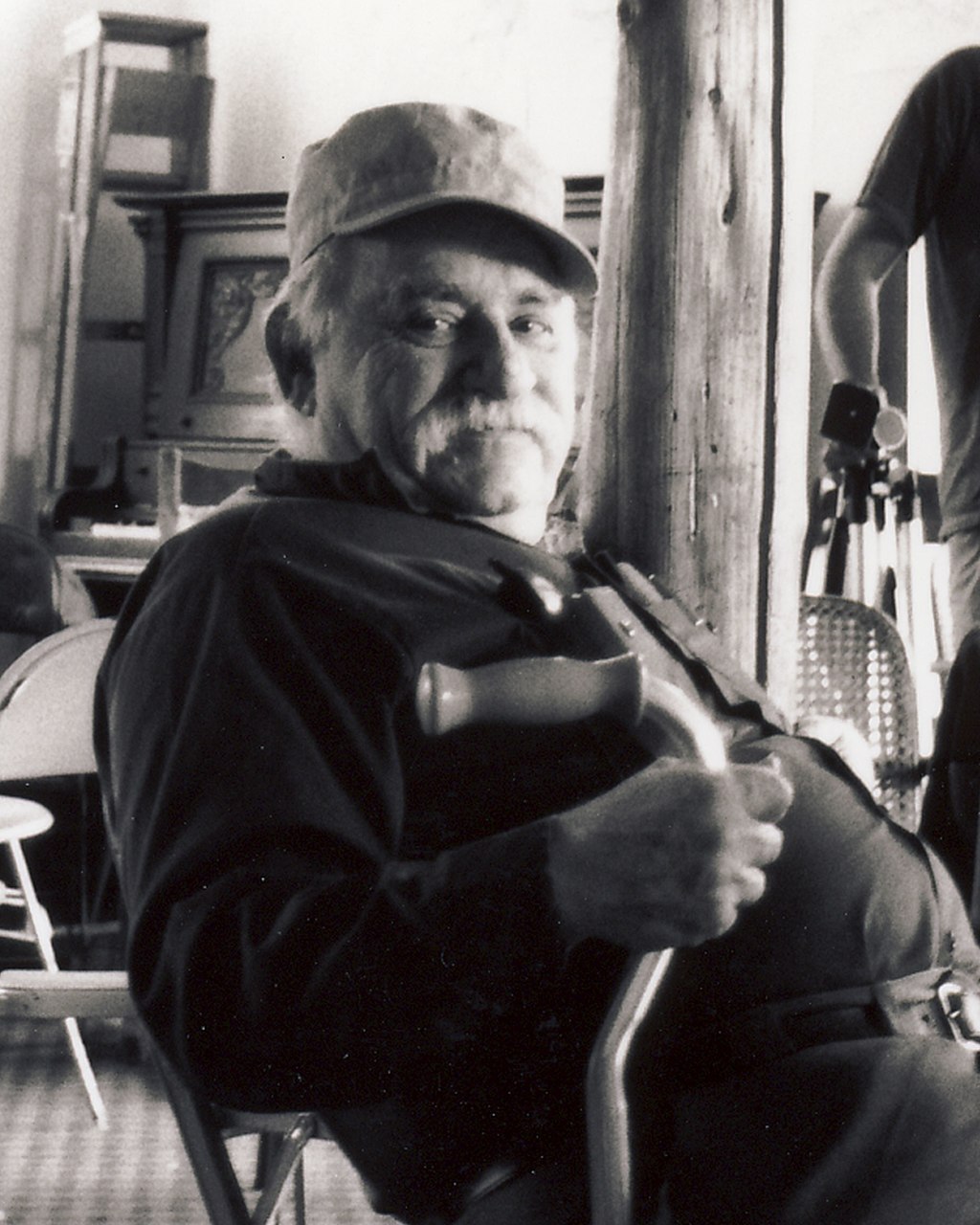 Murray Bookchin, American libertarian socialist theorist and proponent of libertarian municipalism and communalism The Manifesto of Libertarian Communism was written in 1953 by Georges Fontenis for the Federation Communiste Libertaire of France. It is one of the key texts of the anarchist-communist current known as platformism.[170] In 1968, the International of Anarchist Federations was founded during an international anarchist conference in Carrara, Italy to advance libertarian solidarity. It wanted to form "a strong and organized workers movement, agreeing with the libertarian ideas".[171][172] In the United States, the Libertarian League was founded in New York City in 1954 as a left-libertarian political organization building on the Libertarian Book Club.[173][174] Members included Sam Dolgoff,[175] Russell Blackwell, Dave Van Ronk, Enrico Arrigoni[176] and Murray Bookchin. In Australia, the Sydney Push was a predominantly left-wing intellectual subculture in Sydney from the late 1940s to the early 1970s which became associated with the label Sydney libertarianism. Well known associates of the Push include Jim Baker, John Flaus, Harry Hooton, Margaret Fink, Sasha Soldatow,[177] Lex Banning, Eva Cox, Richard Appleton, Paddy McGuinness, David Makinson, Germaine Greer, Clive James, Robert Hughes, Frank Moorhouse and Lillian Roxon. Amongst the key intellectual figures in Push debates were philosophers David J. Ivison, George Molnar, Roelof Smilde, Darcy Waters and Jim Baker, as recorded in Baker's memoir Sydney Libertarians and the Push, published in the libertarian Broadsheet in 1975.[178] An understanding of libertarian values and social theory can be obtained from their publications, a few of which are available online.[179][180] In 1969, French platformist anarcho-communist Daniel Guérin published an essay in 1969 called "Libertarian Marxism?" in which he dealt with the debate between Karl Marx and Mikhail Bakunin at the First International.[181] Libertarian Marxist currents often draw from Marx and Engels' later works, specifically the Grundrisse and The Civil War in France.[182] |
リバータリアン社会主義(1857-1980年代) アナーキスト共産主義者の哲学者ジョセフ・デジャックは1857年の手紙の中で自らをリバタリアン[10]と表現した最初の人物であった[153]。相互 主義的なアナーキスト哲学者ピエール=ジョゼフ・プルードンとは異なり、彼は「労働者が権利を有するのは労働の産物ではなく、その性質が何であれ、労働者 の欲求を満たすことである」と主張していた。 [154][155]アナキストの歴史家であるマックス・ネトラウによれば、リバタリアン共産主義という用語の最初の使用は1880年11月であり、フラ ンスのアナキスト会議がその教義をより明確に特定するために使用したものであった[156]。 フランスのアナキストジャーナリストであるセバスチャン・フォーレは1895年に週刊紙Le Libertaire(リバタリアン)を創刊した[157]。  セバスチャン・フォール、リバタリアン共産主義の著名なフランスの理論家であり、無神論者であり、自由思想の過激派でもあった。 1917年から1923年にかけての革命の波には、ロシアとヨーロッパでアナーキストが積極的に参加した。ロシアのアナキストたちは、1917年2月革命 と10月革命の両方でボリシェヴィキとともに参加した。しかし、ロシア中央部のボリシェヴィキはすぐに自由主義的なアナキストたちを投獄したり地下に追い やったりし始めた。多くの者はウクライナに逃亡し[158]、そこでマフノフシナのためにロシア内戦で白人運動、君主主義者、その他の革命反対派と戦い、 その後、ネストル・マフノが率いるウクライナ革命反乱軍の一員としてボリシェヴィキと戦い、この地域にアナキスト協会を設立した。ボリシェヴィキの勝利 は、労働者や活動家が共産党に入党したため、国際的にアナキズム運動にダメージを与えた。例えばフランスとアメリカでは、CGTとIWWの主要なシンジカ リスト運動のメンバーが共産主義インターナショナルに加入した[159]。 1920年代から1930年代にかけてヨーロッパでファシズムが台頭すると、アナーキストはイタリアで、1934年2月の暴動の際にフランスで [160]、CNT(全国労働者総連合)が選挙をボイコットしたスペインでファシストと闘い始め[161]、1936年にCNTが投票に参加したことで右 派が勝利し、後に人民戦線が政権に返り咲いた。これは支配階級のクーデター未遂とスペイン内戦(1936年-1939年)につながった。[162] グルッポ・コムニスタ・アナルキコ・ディ・フィレンツェは、20世紀初頭に、自由主義的共産主義と無政府主義的共産主義という用語は、スペインにおける密 接な関係(スペインにおける無政府主義)の結果、国際的な無政府主義運動の中で同義語となり、自由主義的共産主義が一般的な用語となったとしている [163]。  1936年革命時のスペインのアナキスト民兵女性たち リバタリアン社会主義が人気の頂点に達したのは1936年のスペイン革命であり、この革命においてリバタリアン社会主義者たちは「あらゆる産業経済で起 こった資本主義に対する最大かつ最も成功した革命」を主導した[164]。 革命の間、生産手段は労働者の管理下に置かれ、労働者協同組合が新しい経済の基礎を形成した[165]。 ガストン・レヴァルによれば、CNTはスペインの最も耕作可能な土地の78%を網羅するレバンテに農民連合を設立した。この地域連合には165万人が住 み、その40%は農民組合によって自主組織された900の農民集落に住んでいた[166]。産業と農業の生産はスペイン共和国の無政府主義者が支配する地 域で最も高く、無政府主義者の民兵は最強の軍事規律を誇ったが、自由主義者と共産主義者は同様に、スペイン内戦における共和国の敗北を「宗派的」な自由主 義社会主義者のせいだと非難した。これらの告発は、ロビン・ハーネルやノーム・チョムスキーのような現代のリバタリアン社会主義者たちによって反論されて おり、彼らはそのような主張には実質的な証拠が欠けていると非難している[167]。 1931年の秋、アナキスト労働組合CNTの過激派によって「30人宣言」が発表され、それに署名した者の中には、CNT書記長(1922-1923年) のジョアン・ペイロ、アンヘル・ペスターニャCNT(1929年の書記長)、フアン・ロペス・サンチェスがいた。1932年、彼らはシンジカリスト党を設 立し、1936年のスペイン総選挙に参加し、2人の下院議員(ペスターニャとベニート・パボン)を得て人民戦線として知られる左派政党連合の一員となっ た。1938年、CNT書記長のオラシオ・プリエトは、イベリア無政府主義者連盟を自由主義社会党に改組し、国政選挙に参加することを提案した [169]。  マレー・ブックチン(アメリカのリバタリアン社会主義理論家であり、リバタリアン自治体主義と共同体主義の提唱者 リバタリアン共産主義宣言は、1953年にジョルジュ・フォンテニスによってフランスのリバタリアン共産主義連盟のために書かれた。1968年、イタリア のカララで開催されたアナキストの国際会議において、リバタリアンの連帯を推進するために国際アナキスト連盟が設立された。アメリカでは、リバタリアン連 盟がリバタリアン・ブック・クラブを土台とした左リバタリアンの政治組織として1954年にニューヨークで設立された。 オーストラリアでは、シドニー・プッシュは、1940年代後半から1970年代前半にかけてシドニーで主に左翼の知的サブカルチャーであり、シドニー・リ バタリアニズムというラベルと結びついた。プッシュのよく知られた仲間には、ジム・ベイカー、ジョン・フラウス、ハリー・フートン、マーガレット・フィン ク、サーシャ・ソルダトウ、[177] レックス・バニング、エヴァ・コックス、リチャード・アップルトン、パディ・マクギネス、デヴィッド・マキンソン、ジャーメイン・グリア、クライヴ・ジェ イムズ、ロバート・ヒューズ、フランク・ムーアハウス、リリアン・ロクソンがいる。プッシュの議論における重要な知的人物の中には、哲学者のデイヴィッ ド・J・アイヴィソン、ジョージ・モルナー、ロエロフ・スミルデ、ダーシー・ウォーターズ、ジム・ベイカーがおり、1975年にリバタリアン・ブロード シート誌に掲載されたベイカーの回顧録『シドニー・リバタリアンとプッシュ』に記録されている[178]。リバタリアンの価値観と社会理論についての理解 は、彼らの出版物から得ることができ、そのうちのいくつかはオンラインで入手可能である[179][180]。 1969年、フランスの綱領主義者である無政府共産主義者のダニエル・ゲランは、第一インターナショナルにおけるカール・マルクスとミハイル・バクーニン の論争を扱った「リバタリアン的マルクス主義か」と呼ばれるエッセイを発表した[181]。リバタリアン的マルクス主義の潮流は、しばしばマルクスとエン ゲルスの後期の著作、特に『グルンドリッセ』と『フランスにおける内戦』から引用している[182]。 |
| Libertarianism in the United States (1943–1980s) H. L. Mencken and Albert Jay Nock were the first prominent figures in the United States to describe themselves as libertarian as synonym for liberal. They believed that Franklin D. Roosevelt had co-opted the word liberal for his New Deal policies which they opposed and used libertarian to signify their allegiance to classical liberalism, individualism and limited government.[183] According to David Boaz, in 1943 three women "published books that could be said to have given birth to the modern libertarian movement".[184] Isabel Paterson's The God of the Machine, Rose Wilder Lane's The Discovery of Freedom and Ayn Rand's The Fountainhead each promoted individualism and capitalism. None of the three used the term libertarianism to describe their beliefs and Rand specifically rejected the label, criticizing the burgeoning American libertarian movement as the "hippies of the right".[185] Rand accused libertarians of plagiarizing ideas related to her own philosophy of Objectivism and yet viciously attacking other aspects of it.[185] In 1946, Leonard E. Read founded the Foundation for Economic Education (FEE), an American nonprofit educational organization which promotes the principles of laissez-faire economics, private property and limited government.[186] According to Gary North, the FEE is the "granddaddy of all libertarian organizations".[187] Karl Hess, a speechwriter for Barry Goldwater and primary author of the Republican Party's 1960 and 1964 platforms, became disillusioned with traditional politics following the 1964 presidential campaign in which Goldwater lost to Lyndon B. Johnson. He and his friend Murray Rothbard, an Austrian School economist, founded the journal Left and Right: A Journal of Libertarian Thought, which was published from 1965 to 1968, with George Resch and Leonard P. Liggio. In 1969, they edited The Libertarian Forum which Hess left in 1971.[188] The Vietnam War split the uneasy alliance between growing numbers of American libertarians and conservatives who believed in limiting liberty to uphold moral virtues. Libertarians opposed to the war joined the draft resistance and peace movements as well as organizations such as Students for a Democratic Society (SDS). In 1969 and 1970, Hess joined with others, including Murray Rothbard, Robert LeFevre, Dana Rohrabacher, Samuel Edward Konkin III and former SDS leader Carl Oglesby to speak at two conferences which brought together activists from both the New Left and the Old Right in what was emerging as a nascent libertarian movement. Rothbard ultimately broke with the left, allying himself with the burgeoning paleoconservative movement.[189][190] He criticized the tendency of these libertarians to appeal to "'free spirits,' to people who don't want to push other people around, and who don't want to be pushed around themselves" in contrast to "the bulk of Americans" who "might well be tight-assed conformists, who want to stamp out drugs in their vicinity, kick out people with strange dress habits, etc." Rothbard emphasized that this was relevant as a matter of strategy as the failure to pitch the libertarian message to Middle America might result in the loss of "the tight-assed majority".[191][192] This left-libertarian tradition has been carried to the present day by Konkin's agorists,[193] contemporary mutualists such as Kevin Carson,[194] Roderick T. Long[195] and others such as Gary Chartier[196] Charles W. Johnson[197][198] Sheldon Richman,[199] Chris Matthew Sciabarra[200] and Brad Spangler.[201] 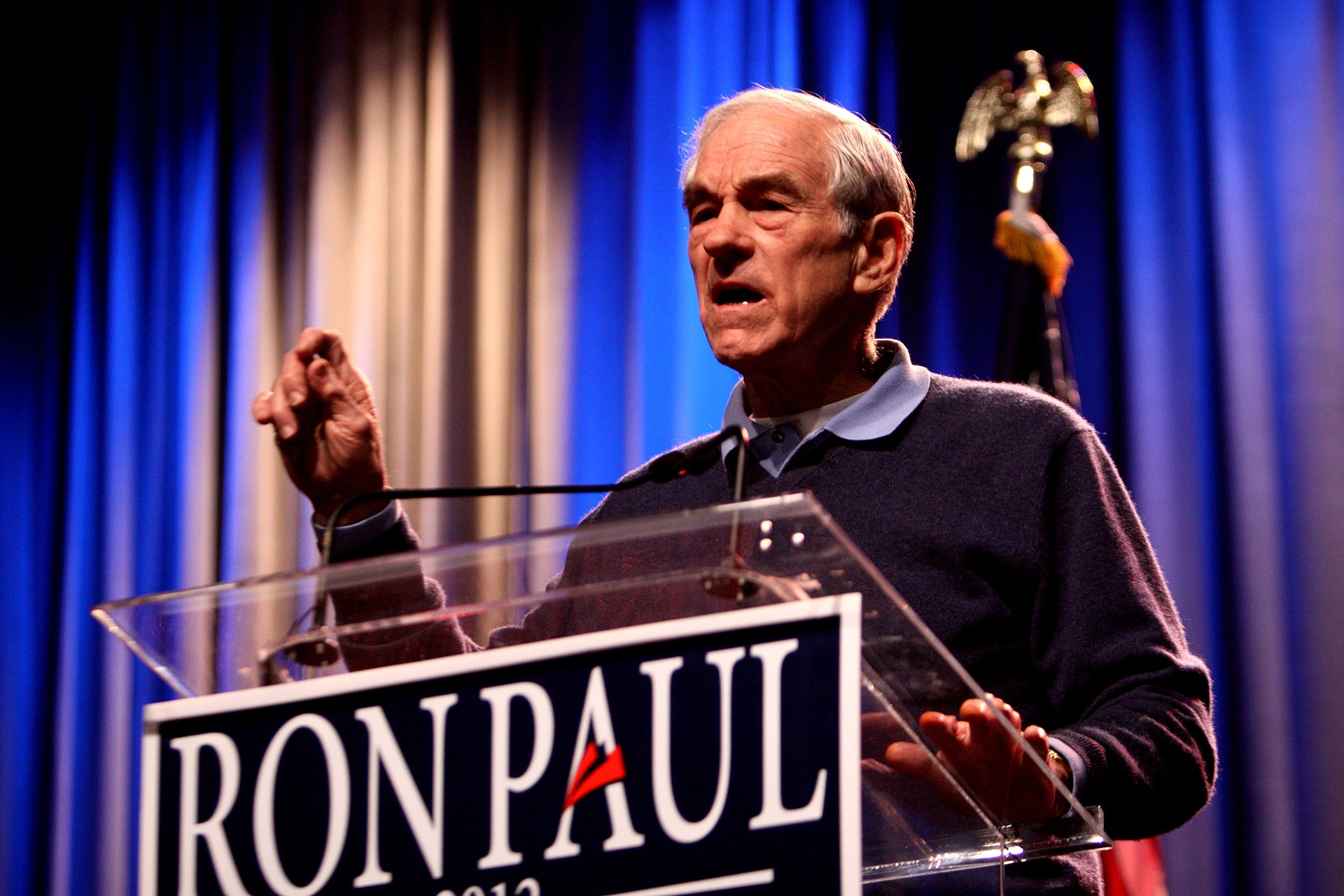 Former Congressman Ron Paul, a self-described libertarian, whose presidential campaigns in 2008 and 2012 garnered significant support from youth and libertarian Republicans In 1971, a small group led by David Nolan formed the Libertarian Party,[202] which has run a presidential candidate every election year since 1972. Other libertarian organizations, such as the Center for Libertarian Studies and the Cato Institute, were also formed in the 1970s.[203] Philosopher John Hospers, a one-time member of Rand's inner circle, proposed a non-initiation of force principle to unite both groups, but this statement later became a required "pledge" for candidates of the Libertarian Party and Hospers became its first presidential candidate in 1972.[204] Modern libertarianism gained significant recognition in academia with the publication of Harvard University professor Robert Nozick's Anarchy, State, and Utopia in 1974, for which he received a National Book Award in 1975.[205] In response to John Rawls' A Theory of Justice, Nozick's book supported a minimal state (also called a nightwatchman state by Nozick) on the grounds that the ultraminimal state arises without violating individual rights[206] and the transition from an ultraminimal state to a minimal state is morally obligated to occur. In the early 1970s, Rothbard wrote: "One gratifying aspect of our rise to some prominence is that, for the first time in my memory, we, 'our side,' had captured a crucial word from the enemy. 'Libertarians' had long been simply a polite word for left-wing anarchists, that is for anti-private property anarchists, either of the communist or syndicalist variety. But now we had taken it over".[207] The project of spreading libertarian ideals in the United States has been so successful that some Americans who do not identify as libertarian seem to hold libertarian views.[208] Since the resurgence of neoliberalism in the 1970s, this modern American libertarianism has spread beyond North America via think tanks and political parties.[209][210] In a 1975 interview with Reason, California Governor Ronald Reagan appealed to libertarians when he stated to "believe the very heart and soul of conservatism is libertarianism".[211] Libertarian Republican Ron Paul supported Reagan's 1980 presidential campaign, being one of the first elected officials in the nation to support his campaign[212] and actively campaigned for Reagan in 1976 and 1980.[213] However, Paul quickly became disillusioned with the Reagan administration's policies after Reagan's election in 1980 and later recalled being the only Republican to vote against Reagan budget proposals in 1981.[214][215] In the 1980s, libertarians such as Paul and Rothbard[216][217] criticized President Reagan, Reaganomics and policies of the Reagan administration for, among other reasons, having turned the United States' big trade deficit into debt and the United States became a debtor nation for the first time since World War I under the Reagan administration.[218][219] Rothbard argued that the presidency of Reagan has been "a disaster for libertarianism in the United States"[220] and Paul described Reagan himself as "a dramatic failure".[213] |
アメリカ合衆国のリバータリアニズム(1943-1980年代) H. H・L・メンケンとアルバート・ジェイ・ノックは、リベラルの対義語として自らをリバタリアン(自由主義者)と表現した最初の著名人である。彼らはフラン クリン・D・ルーズベルトが自分たちが反対するニューディール政策のためにリベラルという言葉を共用していると考え、古典的な自由主義、個人主義、限定政 府への忠誠を示すためにリバタリアンを使用した[183]。 デイヴィッド・ボアズによれば、1943年に3人の女性が「現代のリバタリアン運動を誕生させたと言える本を出版した」[184]。イザベル・パターソン の『機械の神』、ローズ・ワイルダー・レインの『自由の発見』、アイン・ランドの『泉の頭』はそれぞれ個人主義と資本主義を推進した。ランドは、リバタリ アンが彼女自身の哲学である目的論に関連する思想を盗用していると非難し、その一方で、リバタリアンの他の側面を悪意を持って攻撃していると批判した [185]。 1946年、レナード・E・リードは自由放任経済学、私有財産、限定政府の原則を推進するアメリカの非営利教育団体である経済教育財団(FEE)を設立した[186]。ゲイリー・ノースによれば、FEEは「すべてのリバタリアン団体の祖父」である[187]。 バリー・ゴールドウォーターのスピーチライターであり、共和党の1960年と1964年の綱領の主要な執筆者であったカール・ヘスは、ゴールドウォーター がリンドン・B・ジョンソンに敗れた1964年の大統領選挙の後、伝統的な政治に幻滅した。友人のオーストリア学派経済学者マレー・ロスバードとともに雑 誌『Left and Right』を創刊: 同誌はジョージ・レッシュ、レナード・P・リジオとともに1965年から1968年まで発行された。1969年、彼らはヘスが1971年に去った『リバタ リアンフォーラム』を編集した[188]。 ベトナム戦争は、増え続けるアメリカのリバタリアンと、道徳的美徳を守るために自由を制限することを信じる保守派との間の不安な同盟を分裂させた。戦争に 反対するリバタリアンは、徴兵反対運動や平和運動、「民主社会のための学生たち」(SDS)などの組織に参加した。1969年と1970年、ヘスはマ レー・ロスバード、ロバート・ルフェーヴル、ダナ・ローラバッカー、サミュエル・エドワード・コンキン3世、元SDS指導者のカール・オグルスビーらとと もに、新左翼と旧右翼の活動家を集め、新生リバタリアン運動として台頭しつつあった2つの会議で講演した。ロスバードは最終的に左派と決別し、急成長して いた古保守主義運動と手を組むことになった[189][190]。彼は、「アメリカ人の大部分」が「きっちりとした順応主義者である可能性があり、身近な ドラッグを根絶したり、奇妙な服装習慣の人々を追い出したりしたがる」のとは対照的に、「『自由な精神』、他人を振り回したくない人々、そして自分も振り 回されたくない人々」に訴えかけるこれらのリバタリアンの傾向を批判した。ロスバードは、中米にリバタリアンのメッセージを売り込むことに失敗すれば、 「堅物な多数派」を失うことになるかもしれないので、このことは戦略の問題として関連していると強調していた。 [191][192]この左派リバタリアンの伝統はコンキンのアゴリスト[193]、ケヴィン・カーソン[194]、ロデリック・T・ロング[195]な どの現代の相互主義者、ゲイリー・チャーティア[196]、チャールズ・W・ジョンソン[197][198]、シェルドン・リッチマン[199]、クリ ス・マシュー・スキアバラ[200]、ブラッド・スパングラー[201]などによって現代まで受け継がれている。  元下院議員のロン・ポールは自称リバタリアンであり、2008年と2012年の大統領選挙キャンペーンでは若者とリバタリアン共和党員から大きな支持を集めた。 1971年、デイヴィッド・ノーランが率いる小さなグループがリバタリアン党を結成し[202]、1972年以降、選挙のたびに大統領候補を擁立してい る。かつてランドの側近であった哲学者のジョン・ホスパーズは、両グループを結束させるために武力不行使の原則を提案したが、この声明は後にリバタリアン 党の候補者に必須の「誓約」となり、ホスパーズは1972年にその最初の大統領候補となった[204]。 現代のリバタリアニズムは1974年にハーバード大学教授であるロバート・ノージックの『アナーキー、国家、ユートピア』が出版されたことで学界において 重要な認知を得ることとなり、彼は1975年に全米図書賞を受賞している[205]。ジョン・ロールズの『正義論』に対抗して、ノージックの著書は超最小 国家は個人の権利を侵害することなく発生し[206]、超最小国家から最小国家への移行は道徳的に発生する義務があるという理由で最小国家(ノージックは 夜警国家とも呼んでいた)を支持していた。 1970年代初頭、ロスバードは次のように書いている。「われわれが脚光を浴びるようになったことの喜ばしい一面は、私の記憶の中で初めて、われわれ『こ ちら側』が敵から決定的な言葉を奪ったことである。リバタリアン』は長い間、単に左翼アナーキスト、つまり共産主義者やシンジカリストのような反私有財産 のアナーキストを指す丁寧な言葉だった。しかし今や我々はそれを引き継いでいる」[207]。アメリカにおけるリバタリアンの理想を広めるプロジェクトは 非常に成功しており、リバタリアンであると自認していないアメリカ人の中にもリバタリアン的な見解を持つ者がいるようである[208]。 1970年代に新自由主義が復活して以来、この現代アメリカのリバタリアニズムはシンクタンクや政党を通じて北米を越えて広がっている[209] [210]。 1975年のReasonとのインタビューで、カリフォルニア州知事のロナルド・レーガンは「保守主義の心と魂がリバタリアニズムであると信じている」と 述べ、リバタリアンにアピールした[211]。 リバタリアン共和党のロン・ポールはレーガンの1980年の大統領選挙キャンペーンを支援し、彼の選挙キャンペーンを支援した全米で最初の選出議員の一人 であり[212]、1976年と1980年にはレーガンのために積極的にキャンペーンを行った。 [213]しかし、1980年のレーガン当選後、ポールはすぐにレーガン政権の政策に幻滅し、後に1981年にレーガンの予算案に反対票を投じた唯一の共 和党員であったと回想している。 [214][215]1980年代、ポールやロスバード[216][217]といったリバタリアンは、とりわけアメリカの大きな貿易赤字を借金に変え、 レーガン政権下でアメリカは第一次世界大戦以来初めて債務国になったとして、レーガン大統領、レーガノミクス、レーガン政権の政策を批判した。 [218][219]ロスバードはレーガンの大統領職は「アメリカにおけるリバタリアニズムにとっての災難」であったと主張し[220]、ポールはレーガ ン自身を「劇的な失敗」と表現した[213]。 |
| Contemporary libertarianism Contemporary libertarian socialism 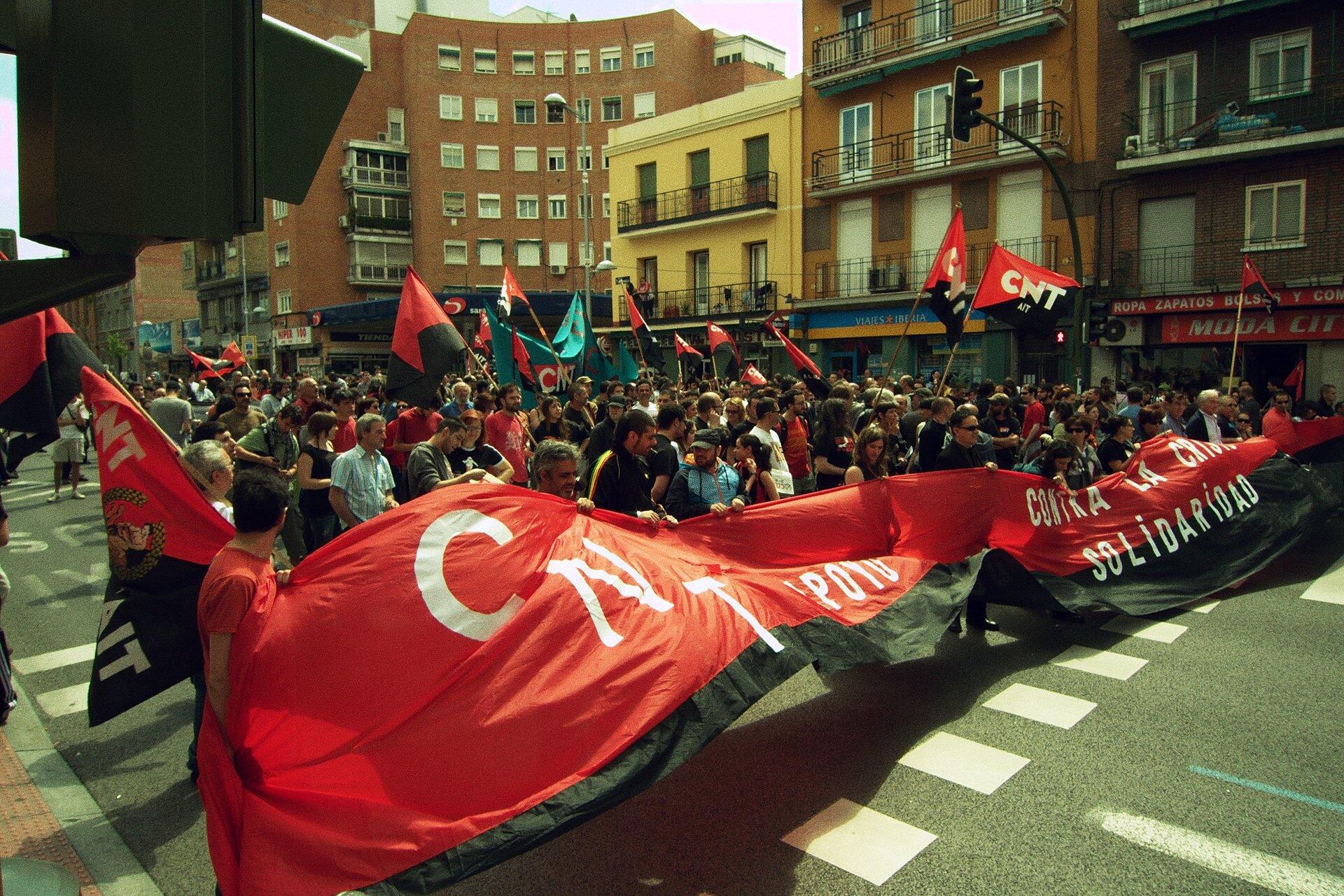 Members of the Spanish anarcho-syndicalist trade union Confederación Nacional del Trabajo marching in Madrid in 2010 A surge of popular interest in libertarian socialism occurred in Western nations during the 1960s and 1970s.[221] Anarchism was influential in the counterculture of the 1960s[222][223][224] and anarchists actively participated in the protests of 1968 which included students and workers' revolts.[225] In 1968, the International of Anarchist Federations was founded in Carrara, Italy during an international anarchist conference held there in 1968 by the three existing European federations of France, the Italian and the Iberian Anarchist Federation as well as the Bulgarian Anarchist Federation in French exile.[172][226] Around the turn of the 21st century, libertarian socialism grew in popularity and influence as part of the anti-war, anti-capitalist and anti-globalisation movements.[31] Anarchists became known for their involvement in protests against the meetings of the World Trade Organization (WTO), Group of Eight and the World Economic Forum. Some anarchist factions at these protests engaged in rioting, property destruction and violent confrontations with police. These actions were precipitated by ad hoc, leaderless, anonymous cadres known as black blocs and other organizational tactics pioneered in this time include security culture, affinity groups and the use of decentralized technologies such as the Internet.[31] A significant event of this period was the confrontations at WTO conference in Seattle in 1999.[31] For English anarchist scholar Simon Critchley, "contemporary anarchism can be seen as a powerful critique of the pseudo-libertarianism of contemporary neo-liberalism. One might say that contemporary anarchism is about responsibility, whether sexual, ecological or socio-economic; it flows from an experience of conscience about the manifold ways in which the West ravages the rest; it is an ethical outrage at the yawning inequality, impoverishment and disenfranchisment that is so palpable locally and globally".[227] This might also have been motivated by "the collapse of 'really existing socialism' and the capitulation to neo-liberalism of Western social democracy".[228] Since the end of the Cold War, there have been at least two major experiments in libertarian socialism: the Zapatista uprising in Mexico, during which the Zapatista Army of National Liberation (EZLN) enabled the formation of a self-governing autonomous territory in the Mexican state of Chiapas;[229] and the Rojava Revolution in Syria, which established the Autonomous Administration of North and East Syria (AANES) as a "libertarian socialist alternative to the colonially established state boundaries in the Middle East."[229] In 2022, student activist and self-described libertarian socialist Gabriel Boric became head of state of Chile after winning the 2021 Chilean presidential election with the Apruebo Dignidad coalition.[54][55][56] Contemporary libertarianism in the United States In the United States, polls (circa 2006) found that the views and voting habits of between 10% and 20%, or more, of voting age Americans might be classified as "fiscally conservative and socially liberal, or libertarian".[78][126] This was based on pollsters' and researchers' defining libertarian views as fiscally conservative and socially liberal (based on the common United States meanings of the terms) and against government intervention in economic affairs and for expansion of personal freedoms.[78] In a 2015 Gallup poll, this figure had risen to 27%.[134] A 2015 Reuters poll found that 23% of American voters self-identified as libertarians, including 32% in the 18–29 age group.[133] Through twenty polls on this topic spanning thirteen years, Gallup found that voters who are libertarian on the political spectrum ranged from 17–23% of the United States electorate.[131] However, a 2014 Pew Poll found that 23% of Americans who identify as libertarians have no idea what the word means. In this poll, 11% of respondents both identified as libertarians and understand what the term meant.[132] In 2001, an American political migration movement, called the Free State Project, was founded to recruit at least 20,000 libertarians to move to a single low-population state (New Hampshire, was selected in 2003) in order to make the state a stronghold for libertarian ideas.[230][231] As of May 2022, approximately 6,232 participants have moved to New Hampshire for the Free State Project.[232] 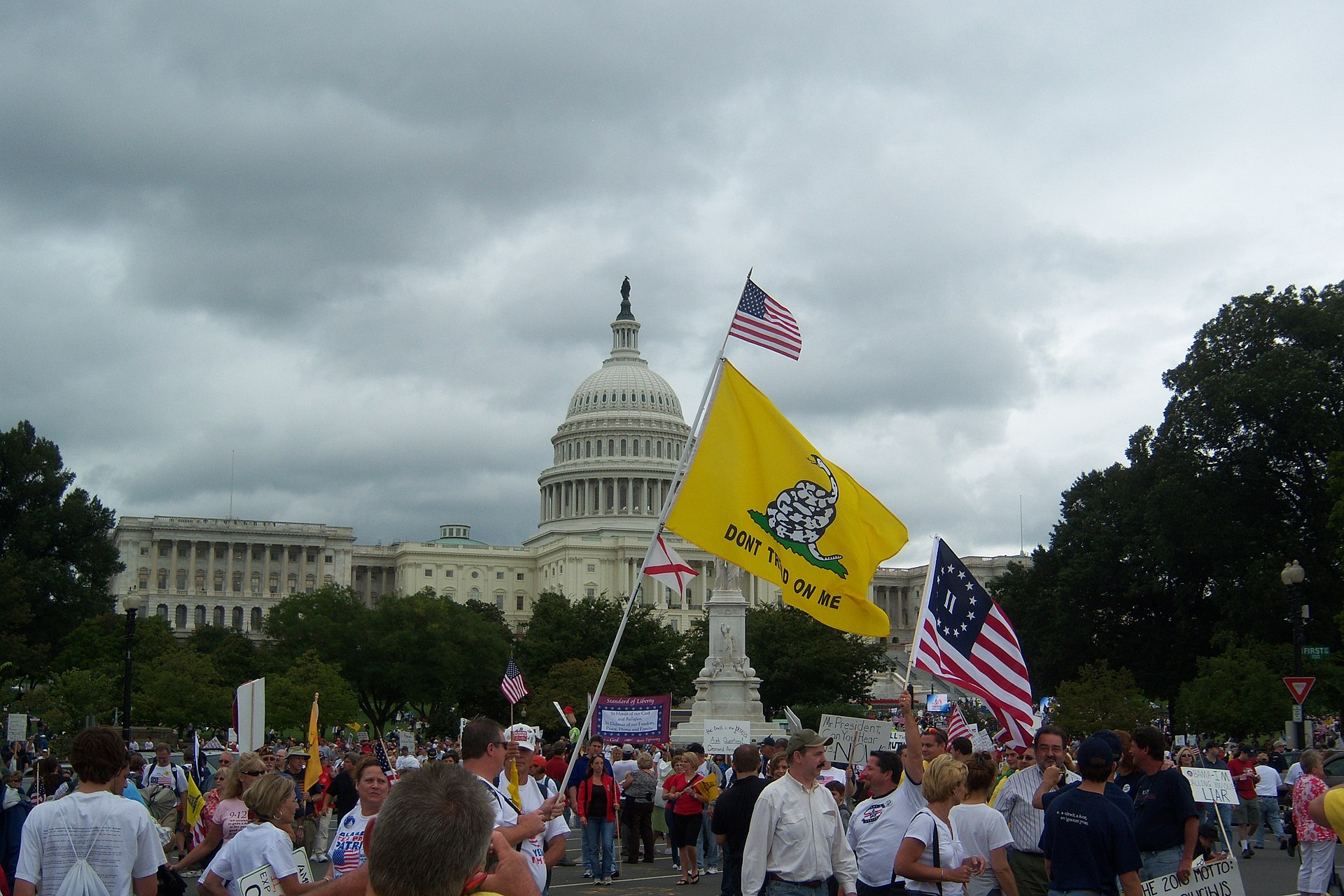 Tea Party movement protest in Washington, D.C., September 2009 2009 saw the rise of the Tea Party movement, an American political movement known for advocating a reduction in the United States national debt and federal budget deficit by reducing government spending and taxes, which had a significant libertarian component[233] despite having contrasts with libertarian values and views in some areas such as free trade, immigration, nationalism and social issues.[234] A 2011 Reason-Rupe poll found that among those who self-identified as Tea Party supporters, 41 percent leaned libertarian and 59 percent socially conservative.[235] Named after the Boston Tea Party, it also contained populist elements.[236][237] By 2016, Politico noted that the Tea Party movement was essentially completely dead; however, the article noted that the movement seemed to die in part because some of its ideas had been absorbed by the mainstream Republican Party.[238] In 2012, anti-war and pro-drug liberalization presidential candidates such as Libertarian Republican Ron Paul and Libertarian Party candidate Gary Johnson raised millions of dollars and garnered millions of votes despite opposition to their obtaining ballot access by both Democrats and Republicans.[239] The 2012 Libertarian National Convention saw Johnson and Jim Gray being nominated as the 2012 presidential ticket for the Libertarian Party, resulting in the most successful result for a third-party presidential candidacy since 2000 and the best in the Libertarian Party's history by vote number. Johnson received 1% of the popular vote, amounting to more than 1.2 million votes.[240][241] Johnson has expressed a desire to win at least 5 percent of the vote so that the Libertarian Party candidates could get equal ballot access and federal funding, thus subsequently ending the two-party system.[242][243][244] The 2016 Libertarian National Convention saw Johnson and Bill Weld nominated as the 2016 presidential ticket and resulted in the most successful result for a third-party presidential candidacy since 1996 and the best in the Libertarian Party's history by vote number. Johnson received 3% of the popular vote, amounting to more than 4.3 million votes.[245] Following the 2022 Libertarian National Convention, the Mises Caucus, a paleolibertarian faction, became the dominant faction on the Libertarian National Committee.[246][247] Chicago school of economics economist Milton Friedman made the distinction between being part of the American Libertarian Party and "a libertarian with a small 'l'," where he held libertarian values but belonged to the American Republican Party.[248] Contemporary libertarianism in the United Kingdom Main article: Libertarianism in the United Kingdom Contemporary libertarianism in Argentina In 2023, Argentine economist Javier Milei became the first openly libertarian head of state,[citation needed] after winning that year's general election with the La Libertad Avanza coalition.[58] Contemporary libertarianism in South Africa Main article: Libertarianism in South Africa |
現代のリバタリアニズム 現代のリバタリアン社会主義  2010年、マドリードで行進するスペインのアナーコ・サンディカリスト労働組合「全国労働者連盟」のメンバーたち。 アナキズムは1960年代のカウンターカルチャーに影響力を持ち[222][223][224]、アナキストたちは学生や労働者の反乱を含む1968年の 抗議行動に積極的に参加した。 [225]1968年にイタリアのカララで開催された国際アナーキスト連盟会議において、フランス、イタリア、イベリア・アナーキスト連盟、フランスに亡 命していたブルガリア・アナーキスト連盟の3つの既存のヨーロッパ連盟によって国際アナーキスト連盟が設立された[172][226]。 21世紀に入ると、リバタリアン社会主義は反戦、反資本主義、反グローバリゼーション運動の一環として人気と影響力を増していった。これらの抗議行動で は、暴動や器物損壊、警察との暴力的な対立を行ったアナーキスト派もいた。これらの行動は、ブラックブロックとして知られるその場限りの、リーダー不在の 匿名の幹部によって引き起こされたものであり、この時期に開拓された他の組織戦術には、セキュリティ文化、親和グループ、インターネットなどの分散型テク ノロジーの利用などがある[31]。この時期の重要な出来事は、1999年にシアトルで開催されたWTO会議での対立であった[31]。現代のアナーキズ ムは、性的、生態学的、社会経済的のいずれにせよ、責任についてのものであり、西側諸国が他を荒廃させる多様な方法についての良心の体験から生まれたもの であり、地域的、世界的に非常に明白である、あくどい不平等、貧困化、権利剥奪に対する倫理的な憤りであると言えるかもしれない」[227]。これはま た、「『本当に存在する社会主義』の崩壊と、西側社会民主主義の新自由主義への屈服」によって動機づけられたかもしれない[228]。 サパティスタ民族解放軍(EZLN)がメキシコのチアパス州における自治領の形成を可能にしたメキシコのサパティスタ蜂起[229]と、「中東における植 民地的に確立された国家境界線に対する自由主義的社会主義的代替案」として北・東シリア自治行政区(AANES)を設立したシリアのロジャヴァ革命 [229]である。 2022年、学生活動家で自称リバタリアン社会主義者のガブリエル・ボリッチは、2021年のチリ大統領選挙でアプルエボ・ディグニダッド連合で勝利し、チリの国家元首となった[54][55][56]。 アメリカにおける現代のリバタリアニズム アメリカ合衆国の世論調査(2006年頃)では、投票年齢のアメリカ人の10%から20%、もしくはそれ以上の意見や投票習慣が「財政的に保守的で社会的 にリベラル、もしくはリバタリアン」に分類される可能性があるとされていた[78][126]。これは世論調査者や研究者がリバタリアンの意見を財政的に 保守的で社会的にリベラル(アメリカ合衆国の一般的な用語の意味に基づく)であり、経済問題への政府の介入に反対し、個人の自由を拡大するものであると定 義したことに基づくものであった。 78]2015年のギャラップの世論調査では、この数字は27%に上昇していた[134]。2015年のロイターの世論調査では、アメリカの有権者の 23%がリバタリアンを自認しており、そのうち18歳から29歳の年齢層では32%であった[133]。 [133]ギャラップは、13年間にわたるこのトピックに関する20の世論調査を通じて、政治的スペクトルにおいてリバタリアンである有権者は、米国の有 権者の17〜23%であることを発見した[131]。 しかし、2014年のピュー世論調査は、リバタリアンを自認するアメリカ人の23%がその言葉の意味を知らないことを発見した。この世論調査では、回答者 の11%がリバタリアンであると自認しており、その言葉の意味を理解していた[132]。 2001年、フリー・ステート・プロジェクトと呼ばれるアメリカの政治的移住運動が設立され、少なくとも20,000人のリバタリアンを募り、人口の少な い一つの州(ニューハンプシャー州が2003年に選ばれた)に移住させ、その州をリバタリアンの思想の拠点とすることを目的としていた[230] [231]。 2022年5月現在、フリー・ステート・プロジェクトのために約6,232人の参加者がニューハンプシャー州に移住している[232]。  2009年9月、ワシントンD.C.でのティーパーティー運動抗議デモ ティーパーティー運動は、自由貿易、移民、ナショナリズム、社会問題などのいくつかの分野でリバタリアンの価値観や見解と対照的であるにもかかわらず、リ バタリアンの重要な要素を持っていた[233]。 [234]2011年のReason-Rupeの世論調査によると、ティーパーティー支持者を自認する人々のうち、41パーセントがリバタリアン寄り、 59パーセントが社会的保守寄りであった[235]。 ボストン茶会にちなんで命名されたティーパーティーは、ポピュリスト的な要素も含んでいた[236][237]。 2016年までにポリティコは、ティーパーティー運動は基本的に完全に死んだと指摘したが、その記事の中では、その運動の思想の一部が共和党の主流派に吸 収されたため、運動が死んだように見えたと指摘している[238]。 2012年、リバタリアン共和党のロン・ポールやリバタリアン党のゲイリー・ジョンソンといった反戦・薬物自由化推進派の大統領候補は、民主・共和両党の 反対にもかかわらず、数百万ドルの資金を集め、数百万票を集めた[239]。ジョンソンは一般投票の1%を獲得し、120万票を超えた[240] [241]。ジョンソンは、リバタリアン党の候補者が平等な投票権と連邦政府からの資金を得ることができるように、少なくとも5%の得票率を獲得し、二大 政党制を終わらせたいと表明している[242][243]。 [242][243][244]2016年のリバタリアン全国大会では、ジョンソンとビル・ウェルドが2016年の大統領候補として指名され、1996年 以来、第三党の大統領候補として最も成功した結果となり、投票数ではリバタリアン党史上最高となった。2022年のリバタリアン全国大会の後、古リバタリ アン派閥であるミーゼス・コーカスがリバタリアン全国委員会の支配的な派閥となった[246][247]。 シカゴ学派の経済学者であるミルトン・フリードマンはアメリカのリバタリアン党の一員であることと、リバタリアンの価値観を持ちながらもアメリカの共和党に所属している「小さな "l "を持つリバタリアン」であることを区別していた[248]。 イギリスにおける現代のリバタリアニズム 主な記事 イギリスにおけるリバタリアニズム アルゼンチンにおける現代のリバタリアニズム 2023年、アルゼンチンの経済学者ハビエル・ミレイが、ラ・リベルタッド・アバンザ連合で同年の総選挙に勝利し、公然とリバタリアンを掲げる初の国家元首となった[要出典][58]。 南アフリカにおける現代のリバタリアニズム 主な記事 南アフリカにおけるリバタリアニズム |
| Contemporary libertarian organizations See also the categories Anarchist organizations, Libertarian parties, Libertarian publications, and Libertarian think tanks Current international anarchist federations which identify themselves as libertarian include the International of Anarchist Federations, the International Workers' Association and International Libertarian Solidarity. The largest organized anarchist movement today is in Spain, in the form of the Confederación General del Trabajo (CGT) and the Confederación Nacional del Trabajo (CNT).[citation needed] CGT membership was estimated to be around 100,000 for 2003.[249] Other active syndicalist movements include the Central Organisation of the Workers of Sweden and the Swedish Anarcho-syndicalist Youth Federation in Sweden, the Unione Sindacale Italiana in Italy, Workers Solidarity Alliance in the United States, and Solidarity Federation in the United Kingdom. The revolutionary industrial unionist Industrial Workers of the World claiming 2,000 paying members as well as the International Workers' Association, remain active. In the United States, there exists the Common Struggle – Libertarian Communist Federation.[citation needed] Since the 1950s, many American libertarian organizations have adopted a free-market stance as well as supporting civil liberties and non-interventionist foreign policies. These include the Ludwig von Mises Institute, Francisco Marroquín University, the Foundation for Economic Education, Center for Libertarian Studies, the Cato Institute and Liberty International. The activist Free State Project, formed in 2001, works to bring 20,000 libertarians to New Hampshire to influence state policy.[250] Active student organizations include Students for Liberty and Young Americans for Liberty. A number of countries have libertarian parties that run candidates for political office. In the United States, the Libertarian Party was formed in 1972 and is the third largest[251][252] American political party, with 511,277 voters (0.46% of total electorate) registered as Libertarian in the 31 states that report Libertarian registration statistics and Washington, D.C.[253] |
現代のリバタリアン団体 アナキスト組織、リバタリアン政党、リバタリアン出版物、リバタリアンシンクタンクのカテゴリーも参照のこと。 現在、リバタリアンであることを自認する国際的なアナキスト連合には、国際アナキスト連合、国際労働者協会、国際リバタリアン連帯がある。今日、組織化さ れたアナーキスト運動で最も大きいのはスペインで、CGT(スペイン労働総同盟)とCNT(スペイン労働総同盟)の形態である[citation needed] 。 [その他の活発なシンジカリスト運動には、スウェーデンのスウェーデン労働者中央組織とスウェーデン・アナルコ・シンディカリスト青年連合、イタリアのイ タリア・シンジカリア連合、アメリカの労働者連帯同盟、イギリスの連帯連合がある。2,000人の有料組合員を擁する革命的産業別組合主義の世界産業別労 働者組合や国際労働者協会も、依然として活動している。アメリカには、共通闘争-リバタリアン共産主義者連盟がある。 1950年代以降、アメリカの多くのリバタリアン団体は、自由市場のスタンスを採用し、市民的自由や不介入主義の外交政策を支持してきた。例えば、ルートヴィヒ・フォン・ミーゼス研究所、フランシスコ・マロキン大学、 経済教育財団、リバタリアン研究センター、ケイトー研究所、リバティ・インターナショナルなどである。2001年に結成された活動家フリー・ステート・プ ロジェクトは、州政策に影響を与えるために2万人のリバタリアンをニューハンプシャーに呼び込むために活動している[250]。活発な学生団体としては、 Students for LibertyやYoung Americans for Libertyがある。多くの国にリバタリアン政党があり、政治家候補を擁立している。アメリカでは、リバタリアン党が1972年に結成され、リバタリア ン登録統計を報告している31州とワシントンD.C.で511,277人の有権者(総有権者の0.46%)がリバタリアンとして登録されている[251] [252]アメリカ第3位の政党である[253]。 |
| Criticism Main article: Criticism of libertarianism Criticism of libertarianism includes ethical, economic, environmental, pragmatic and philosophical concerns, especially in relation to right-libertarianism,[254] including the view that it has no explicit theory of liberty.[74] It has been argued that laissez-faire capitalism does not necessarily produce the best or most efficient outcome,[255][256] nor does its philosophy of individualism and policies of deregulation prevent the abuse of natural resources.[257] Critics have accused libertarianism of promoting "atomistic" individualism that ignores the role of groups and communities in shaping an individual's identity.[4] Libertarians have responded by denying that they promote this form of individualism, arguing that recognition and protection of individualism does not mean the rejection of community living.[4] Libertarians also argue that they are simply against individuals' being forced to have ties with communities and that individuals should be allowed to sever ties with communities they dislike and form new communities instead.[4] Critics such as Corey Robin describe this type of libertarianism as fundamentally a reactionary conservative ideology united with more traditionalist conservative thought and goals by a desire to enforce hierarchical power and social relations.[97] Similarly, Nancy MacLean has argued that libertarianism is a radical right ideology that has stood against democracy. According to MacLean, libertarian-leaning Charles and David Koch have used anonymous, dark money campaign contributions, a network of libertarian institutes and lobbying for the appointment of libertarian, pro-business judges to United States federal and state courts to oppose taxes, public education, employee protection laws, environmental protection laws and the New Deal Social Security program.[258] Conservative philosopher Russell Kirk argued that libertarians "bear no authority, temporal or spiritual" and do not "venerate ancient beliefs and customs, or the natural world, or [their] country, or the immortal spark in [their] fellow men."[4] Libertarians have responded by saying that they do venerate these ancient traditions, but are against the law's being used to force individuals to follow them.[4] |
批評 主な記事 リバタリアニズムに対する批判 リバタリアニズムに対する批判には、倫理的、経済的、環境的、実践的、哲学的な懸念が含まれ、特に右派リバタリアニズムとの関係では、明確な自由の理論を 持っていないという見解も含まれている[254][74]。自由放任の資本主義は必ずしも最良または最も効率的な結果を生み出すわけではなく[255] [256]、個人主義の哲学や規制緩和の政策が天然資源の乱用を防ぐわけでもないと論じられている[257]。 批評家たちはリバタリアニズムが個人のアイデンティティを形成する上での集団やコミュニティの役割を無視した「原子論的な」個人主義を促進していると非難 している[4]。リバタリアンはこれに対して、このような形の個人主義を促進していることを否定し、個人主義の承認と保護はコミュニティ生活の拒絶を意味 するものではないと主張している[4]。リバタリアンはまた、単に個人がコミュニティとの結びつきを持つことを強制されることに反対しているだけであり、 個人は嫌いなコミュニティとの結びつきを断ち切り、代わりに新しいコミュニティを形成することが許されるべきだと主張している[4]。 コリー・ロビンのような批評家は、この種のリバタリアニズムは基本的に反動的な保守思想であり、階層的な権力と社会関係を強制したいという願望によって、 より伝統主義的な保守思想や目標と一体化していると評している[97]。同様に、ナンシー・マクリーンは、リバタリアニズムは民主主義に歯向かった急進的 な右派思想であると主張している。マクリーンによれば、リバタリアンに傾倒するチャールズ・コッホとデイヴィッド・コッホは、匿名のダークマネーによる選 挙献金、リバタリアン研究所のネットワーク、税、公教育、従業員保護法、環境保護法、ニューディール社会保障制度に反対するために、アメリカの連邦裁判所 や州裁判所にリバタリアンでビジネス寄りの裁判官を任命するためのロビー活動を利用してきた[258]。 保守的な哲学者であるラッセル・カークは、リバタリアンは「時間的、精神的な権威を持たない」と主張し、「古代の信仰や慣習、自然界、国、仲間の中にある不滅の輝きを崇拝しない」と述べた[4]。 |
| Classical liberalism Christian libertarianism Fusionism Green libertarianism Libertarian feminism List of libertarian political ideologies Neoclassical liberalism Non-aggression principle Objectivism Outline of libertarianism Paleolibertarianism "Property is theft!" Refusal of work "Taxation is theft!" Technolibertarianism |
古典的自由主義 キリスト教リバタリアニズム フュージョニズム 緑のリバタリアニズム リバタリアンフェミニズム リバタリアン政治イデオロギー一覧 新古典派自由主義 非攻撃主義 目的論 リバタリアニズムの概要 古リバタリアニズム 「財産は窃盗である」 労働の拒否 「課税は窃盗だ テクノリバタリアニズム |
| https://en.wikipedia.org/wiki/Libertarianism |
リ ンク
文 献
そ の他の情報
Copyleft, CC, Mitzub'ixi Quq Chi'j, 1996-2099
☆
 ☆
☆